#question what you define as authority and WHO has authority and WHY they have authority
Explore tagged Tumblr posts
Text
also relating to people calling palestinian gfms scams... the "trusting third parties with no authority" thing from that person and people like them really gets me. bc that person on their first blog claims to be anti-fash and anti-cop. and yet... need to see some authority from people vetting fundraisers. like. yes please, tell me, white western tumblr user that claims to be a leftist, what ARE your ideas about authority? and whose authority do you deem valid, my fellow whitey? is it, perhaps, that you only view white, western "authority" as valid? that only white, western institutions have "authority"? why is this "authority" so important to you, so-called anti-fascist and anti-cop white leftist? is it, perhaps, that your ideas about what gives a person or entity "authority" is steeped in racism and western ideas of what "authority" is?
#butch speaks#can you tell i'm pissed about this?#its always been infuriating don't get me wrong. but i had some thoughts to share#anyways. this is the last thing i'm gonna say about that person.#question what you define as authority and WHO has authority and WHY they have authority#there is a kinder part of me that knows i could have been nicer about that.#i DO hope they get better. i do hope they get why that was such a cruel thing to do and say. i hope they do some self reflection#but the instant vindictive attitude? talking down to me and being shitty ON THE ASK sent to me by someone in a desperate situation? cruel.#i wish them a very therapy and get well soon#also. question who and what you see as 'authority' if you're going to dare call yourself anti-fash and anti-cop#peace and love on planet earth yall. support palestinians.
10 notes
·
View notes
Text
How to pull off descriptions
New authors always describe the scene and place every object on the stage before they press the play button of their novels. And I feel that it happens because we live in a world filled with visual media like comics and films, which heavily influence our prose.
In visual media, it’s really easy to set the scene—you just show where every object is, doesn’t matter if they’re a part of the action about to come or not. But prose is quite different from comics and films. You can’t just set the scene and expect the reader to wait for you to start action of the novel. You just begin the scene with action, making sure your reader is glued to the page.
And now that begs the question—if not at the beginning, where do you describe the scene? Am I saying you should not use descriptions and details at all? Hell naw! I’m just saying the way you’re doing it is wrong—there’s a smarter way to pull off descriptions. And I’m here to teach that to you.
***
#01 - What are descriptions?
Let’s start with the basics—what are descriptions? How do you define descriptions? Or details, for that matter? And what do the words include?
Descriptions refer to… descriptions. It’s that part of your prose where you’re not describing something—the appearance of an object, perhaps. Mostly, we mean scene-descriptions when we use the term, but descriptions are more than just scene-descriptions.
Descriptions include appearances of characters too. Let’s call that character-descriptions.
Both scene-descriptions and character-descriptions are forms of descriptions that we regularly use in our prose. We mostly use them at the beginning of the scene—just out of habit.
Authors, especially the newer ones, feel that they need to describe each and every nook and cranny of the place or character so they can be visualized clearly by their readers, right as the authors themselves visualized them. And they do that at the start of the scene because how can you visualize a scene when you don’t know how the scene looks first.
And that’s why your prose is filled with how the clouds look or what lights are on the room before you even start with the dialogues and action. But the first paragraph doesn’t need to be a simple scene-description—it makes your prose formulaic and predictable. And boring. Let me help you with this.
***
#02 - Get in your narrator’s head
The prose may have many MCs, but a piece of prose only has a single narrator. And these days, that’s mostly one of the characters of your story. Who uses third-person omniscient narrator these days anyway? If that’s you, change your habits.
Anyway, know your narrator. Flesh out their character. And then internalize them—their speech and stuff like that. Internalize your narrator to such an extent that you can write prose from their point-of-view.
Now, I don’t mean to say that only your narrator should be at the center of the scene—far from it. What I mean is you should get into your narrator’s head.
You do not describe a scene from the eyes of the author—you—but from the eyes of the narrator. You see from their eyes, and understand what they’re noticing. And then you write that.
Start your scene with what the narrator is looking at.
For example,
The dark clouds had covered the sky that day. The whole classroom was in shades of gray—quite unusual for someone like Sara who was used to the sun. She felt the gloom the day had brought with it—the gloom that no one else in her class knew of.
She never had happy times under the clouds like that. Rain made her sad. Rain made her yearn for something she couldn’t put into words. What was it that she was living for? Money? Happiness?
As she stared at the sky through the window, she was lost in her own quiet little corner. Both money and happiness—and even everything else—were temporary. All of it would leave her one day, then come back, then leave, then come back, like the waves of an ocean far away from any human civilization in sight.
All of it would come and go—like rain, it’d fall on her, like rain, it’d evaporate without proof.
And suddenly, drops of water began hitting the window.
You know it was a cloudy day, where it could rain anytime soon. You know that for other students, it didn’t really matter, but Sara felt really depressed because of the weather that day. You know Sara was at the corner, dealing with her emotions alone.
It’s far better than this,
The dark clouds covered the sky that day. It could rain anytime soon.
From her seat at the corner of the room, Sara stared at the sky that made everything gray that day. She…
The main reason it doesn’t work is that you describe the scene in the first paragraph, but it’s devoid of any emotions. Of any flavor. It’s like a factual weather report of the day. That’s what you don’t want to do—write descriptions in a factual tone.
If you want to pull off the prior one, get to your narrator’s head. See from their eyes, think from their brain. Understand what they’re experiencing, and then write that experience from their POV.
Sara didn’t care what everyone was wearing—they were all probably in their school uniforms, obviously, so I didn’t describe that. Sara didn’t focus on how big the classroom was, or how filled, or what everybody was doing. Sara was just looking at the clouds and the clouds alone, hearing everybody just living their normal days, so I mentioned just those things.
As the author, you need to understand that only you, the author are the know-it-all about the scene, not your narrator. And that you’re different from your narrator.
Write as a narrator, not as an author.
***
#03 - Filler Words
This brings me to filler words. Now, hearing my advice, you might start writing something like this,
Sarah noticed the dark clouds through the window. She saw that they’d saturated the place gray.
Fillers words like “see”, “notice”, “stare”, “hear” should be ignored. But many authors who begin writing from the POV of the characters start using these verbs to describe what the character is experiencing.
But remember, the character is not cognizant of the fact that they’re seeing a dark cloud, just that it’s a dark cloud. You don’t need these filler words—straight up describe what the character is seeing, instead of describing that the character is seeing.
Just write,
There were dark clouds on the other end of the window, which saturated the place gray.
Sarah is still seeing the clouds, yeah. But we’re looking from her eyes, and her eyes ain’t noticing that she’s noticing the clouds.
It’s kinda confusing, but it’s an important mistake to avoid. Filler words can really make your writing sound more amateurish than before and take away the experience of the reader, because the reader wants to see through the narrator’s eyes, not that the narrator is seeing.
***
#04 - Characters
Character-descriptions are a lot harder to pull off than scene-descriptions. Because it’s really confusing to know when to describe them, their clothing, their appearances, and what to tell and what not to.
For characters, you can give a full description of their looks. Keep it concise and clear, so that your readers can get a pretty good idea of the character with so few words that they don’t notice you’ve stopped action for a while.
Or can show your narrator scanning the character, and what they noticed about them.
Both these two tricks only work when a character is shown first time to the readers. After that, you don’t really talk about their clothing or face anymore.
Until there’s something out of the ordinary about your character.
What do I mean by that? See, you’ve described the face and clothes of the character, and the next time they appear, the reader is gonna imagine the character in a similar set of clothes, with the same face and appearance that they had the first time. Therefore, any time other than the first, you don’t go into detail about the character again. But, if something about your character is out of ordinary—there are bruises on their face, scars, or a change in the way they dress—describe it to the reader. That’s because your narrator may notice these little changes.
***
#05 - Clothing
Clothing is a special case. Some new authors describe the clothes of the characters when they’re describing the character every time the reader sees them. So, I wanna help you with this.
Clothing can be a way to show something about your character—a character with a well-ironed business suit is gonna be different from a character with tight jeans and baggy t-shirt. Therefore, only use clothing to tell something unique about the character.
Refrain from describing the clothing of characters that dress like most others. Like, in a school, it’s obvious that all characters are wearing school uniforms. Also, a normal teenage boy may wear t-shirts and denim jeans. If your character is this, no need to describe their clothing—anything the reader would be imagining is fine.
Refrain from describing the clothing of one-dimensional side-characters—there’s a high chance you’ve not really created them well enough that they have clothing that differs from the expectations of the readers. We all know what waiters wear, or what a college guy who was just passing by in the scene would be wearing.
You may describe the clothing of the important character in the story, but only in the first appearance. After that, describe their clothes only if the clothes seem really, really different from the first time. And stop describing their clothes if you’ve set your character well enough in the story that your readers know what to expect from them in normal circumstances—then, describe clothes only when they’re really, really different from their usual forms of clothing.
***
#06 - Conclusion
I think there was so much I had to say in this article, but I didn’t do a good job. However, I said all that I wanted to say. I hope you guys liked the article and it helps you in one way or the other.
And please subscribe if you want more articles like this straight in your inbox!
#writers and poets#writers on tumblr#writerscommunity#writeblr#writing#creative writing#writing resources#writing advice#writing tips#writing descriptions#character descriptions
4K notes
·
View notes
Text
Which Disney princess would you be and why?
Timeless reading
**•̩̩͙✩•̩̩͙*˚*•̩̩͙✩•̩̩͙*˚**•̩̩͙✩•̩̩͙*˚*•̩̩͙✩•̩̩͙*˚**•̩̩͙✩•̩̩͙*˚˚*•̩̩͙✩•̩̩͙*˚*
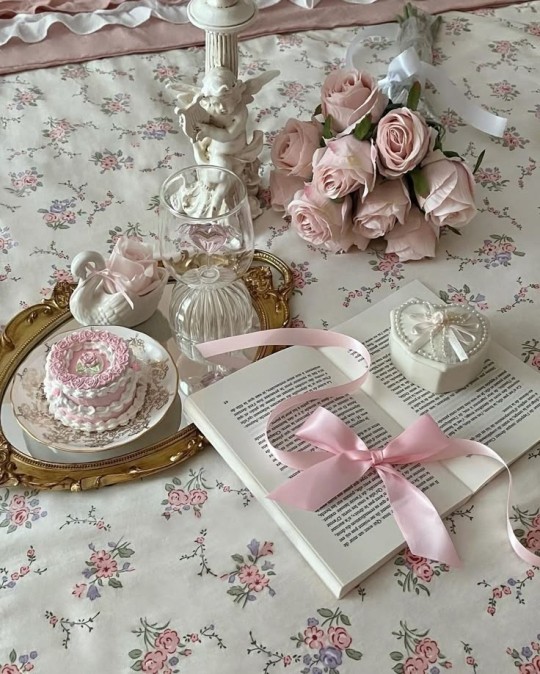
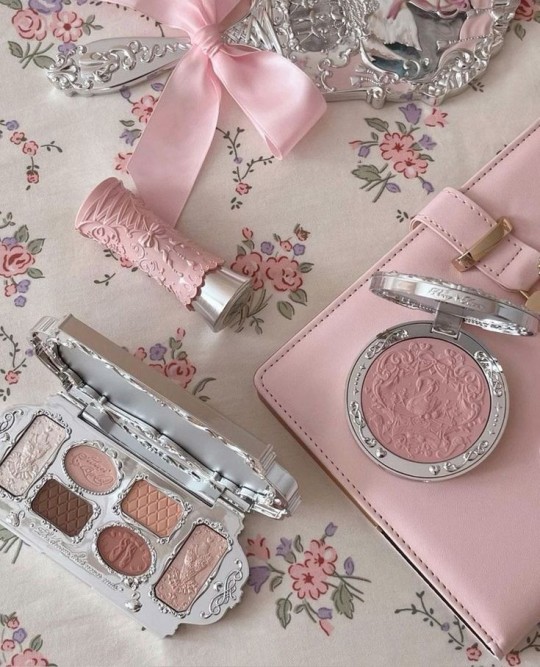
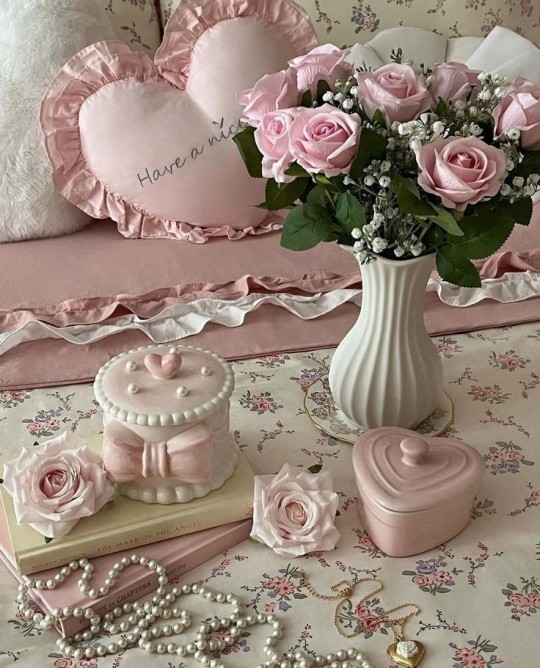
**•̩̩͙✩•̩̩͙*˚*•̩̩͙✩•̩̩͙*˚**•̩̩͙✩•̩̩͙*˚*•̩̩͙✩•̩̩͙*˚**•̩̩͙✩•̩̩͙*˚˚*•̩̩͙✩•̩̩͙*˚*
How to choose a pile?
Close your eyes and take a deep breath and ask the angels to show you the right pile for you and open your eyes. The first pile that catches your attention is the right pile for you.
This is a general reading so take what resonates and leave the rest!
Masterlist 🍒 Extended masterlist
Paid services
I am currently running short on funds and am unable to pay my rent, I would really appreciate some help 🙏🏻
THANK YOU SO MUCH FOR YOUR LOVE AND SUPPORT 🫶🏻💞
**•̩̩͙✩•̩̩͙*˚*•̩̩͙✩•̩̩͙*˚**•̩̩͙✩•̩̩͙*˚*•̩̩͙✩•̩̩͙*˚**•̩̩͙✩•̩̩͙*˚˚*•̩̩͙✩•̩̩͙*˚*
Pile 1
If you were to embody a Disney princess, you'd likely resonate deeply with Mulan and Moana.
Starting with Mulan, there’s a natural connection here due to your deep respect and love for your family and culture. Just like Mulan, you feel a strong responsibility to protect and honor your family. This could mean taking on the role of looking after your father, possibly even working with him or supporting his business. You don’t see these responsibilities as burdens, but rather as an honor, much like Mulan stepping up to protect her father and family when they needed her the most. You have that same fire within you—a drive that makes you stand up for the people you care about.
Your path, like Moana’s, is not confined by societal expectations. You’re someone who values independence and is ready to challenge the limits of what others think you should be or do. You’re always learning, always growing, and you’re not content with just “following the rules.” You want to make your own path, just as Moana did when she set out on her journey across the ocean, even though her entire village expected her to stay put. There's a deep explorer within you, someone who wants to experience life beyond traditional boundaries and limitations.
One thing that truly defines you is your straightforwardness. You’re not one to dance around the point you say what you mean, directly and with confidence. You may even have a sharp or deep voice that demands respect and conveys authority. People know where they stand with you, and that honesty is something that draws others to you and gains their respect.
Your courageous nature shines through in every part of your life. You’re not afraid to take the lead, to stand up for what’s right, and to go after your goals no matter how long it may take. In many ways, you have a warrior spirit; you’re determined, ambitious, and won’t settle for anything less than what you’ve dreamed of achieving. Like Mulan on the battlefield and Moana on her journey across the sea, you face challenges head-on, fully committed to coming out victorious.
This fierce independence is a core part of who you are, and it shows in your reluctance to rely on others for help. You’ve learned, maybe from a young age, to take responsibility for your own life and decisions. It’s possible you’ve had significant responsibilities from a young age, perhaps as the eldest child or someone others depended on, which has made you resourceful and strong. Now, you’re in a place where you’re even more eager to carve your own path and live life on your terms.
Curiosity and intelligence are two of your standout traits. You’re someone who questions everything, eager to understand the world in a deep way, and you don’t just accept things at face value. This makes you a natural explorer, someone constantly learning and searching for meaning, whether it’s through intellectual pursuits, travel, or self-discovery. You might have a fire or air sign as your Sun, Moon, or Rising.
Random things that may resonate : maroon red, eldest daughter, pretty handsome, short or medium height, group of 3 friends, novels/books, glasses, round eyes, parrot, hats.
**•̩̩͙✩•̩̩͙*˚*•̩̩͙✩•̩̩͙*˚**•̩̩͙✩•̩̩͙*˚*•̩̩͙✩•̩̩͙*˚**•̩̩͙✩•̩̩͙*˚˚*•̩̩͙✩•̩̩͙*˚*
Pile 2
If you were to embody a Disney princess, Rapunzel would be a perfect match for you. There’s something about your life journey that aligns with hers a sense of yearning for freedom, adventure, and the desire to find something truly meaningful.
From a young age, you may have felt like you were held back, perhaps by the restrictions of family or the walls of your own home. Like Rapunzel, you sensed that there was a big, exciting world beyond the limits of your surroundings, but you might not have been allowed to step out and explore on your own. It’s possible that you had strict parents or a family that wanted to keep you close and safe, but this may have also made you feel confined. You’ve always known there’s more to life and have longed for the chance to experience it firsthand.
You have many dreams and aspirations, which fuels your journey to find something truly meaningful. Some of you may be in search of your life purpose or even a career that will make you feel alive and fulfilled. There’s a deep sense within you that you’re meant for greatness, but at times, you may feel restricted by family expectations or responsibilities. This drive for something greater keeps pushing you forward, even when it feels challenging to break free from those limitations.
Just as Rapunzel treasured her hair, it seems that you also hold a deep connection to yours. Whether it’s long, well-cared-for, or something you’re known for, your hair might even reflect how you’re feeling. In times of transformation or emotional shifts, you might experiment with your hair, changing it up to mark a new beginning. It’s almost as if your hair is a symbol of your personal growth, a reflection of your resilience, and the beauty that lies within you.
You may feel a bit of a distance in your relationship with your parents or family. It’s not that there’s a lack of love; rather, there may be an invisible barrier that makes true connection challenging. Like Rapunzel, you might feel like you’re waiting for the day when you can break free of these unseen walls and find that sense of freedom and individuality. This may be why you’re drawn to finding your own path, something that defines you and allows you to be yourself without restrictions.
Creativity and spontaneity are other traits that connect you to Rapunzel. You have a spark of imagination and a playful side, someone who can turn any situation into an adventure. Whether it’s through art, ideas, or even just the way you approach life, you know how to make things vibrant and alive. This ability to bring color and joy into the world is something that makes you truly special. Your story is one of discovering yourself, breaking free from constraints, and finding a purpose that fills you with joy. Like Rapunzel, you’re on a journey to step into the world and make it your own, letting nothing hold you back. You have the courage, the creativity, and the strength to shine, and once you step out into your own light, there’s no limit to the magic you’ll create.
Random messages that may resonate: water sign, arts or art major, curly hair, autumn, Taurus, white and red dresses, blindfolded, moving away, knight in shining Armor.
**•̩̩͙✩•̩̩͙*˚*•̩̩͙✩•̩̩͙*˚**•̩̩͙✩•̩̩͙*˚*•̩̩͙✩•̩̩͙*˚**•̩̩͙✩•̩̩͙*˚˚*•̩̩͙✩•̩̩͙*˚*
Pile 3
Like Belle, you are someone who values knowledge and understanding. You have a deep appreciation for learning and personal growth, which drives you to explore new ideas and experiences. Just as Belle is often found with her nose in a book, you, too, are likely someone who seeks wisdom and insight, eager to expand your horizons. This thirst for knowledge not only enriches your life but also sets you apart from those around you, much like Belle’s unique perspective in her village.
Your ability to work well with others suggests that you have a collaborative spirit. You understand the importance of teamwork and the power of building relationships. Whether it's through family, friends, or colleagues, you recognize that great things can be achieved when people come together. Just as Belle works with the enchanted objects in the castle, you thrive in environments where you can connect and collaborate, bringing your talents to the table to create something beautiful and meaningful.
However, your journey also includes a sense of transition and growth. You might have experienced significant changes in your life, moving away from familiar surroundings or letting go of old beliefs that no longer serve you. This willingness to embrace change is a sign of your strength. Much like Belle leaving her home for the Beast’s castle, you are open to new experiences that lead to personal transformation.
You possess a nurturing quality, reflecting the warmth and care that Belle shows to those she loves. You likely have a deep sense of empathy, wanting to uplift and support others. This makes you a source of comfort for those around you, and people naturally gravitate toward your kind heart. Just as Belle helps the Beast see the beauty within himself, you have a way of bringing out the best in others, showing them that they are worthy of love and respect.
At the same time, you may find yourself in moments of solitude or deep reflection. Just as Belle often finds solace in her own thoughts, you may cherish your alone time, using it as a way to gain insight into yourself and the world around you. This introspective side allows you to process your experiences, helping you grow into a more well-rounded individual. It’s during these quiet moments that you gain clarity and strengthen your inner resolve.
Your willingness to embrace transformation indicates that you’re not afraid to face challenges head-on. Just as Belle navigates the complexities of her relationship with the Beast, you have the courage to confront difficult situations and seek growth through them. You understand that change can be uncomfortable, but it is often necessary for evolution. This resilience speaks volumes about your character.
Family and legacy are also important themes in your life. Just as Belle values her relationship with her father, you may find that family plays a significant role in shaping who you are. You likely cherish the bonds you have with loved ones and aspire to build a life filled with love and stability. Your dedication to those you care about reflects a desire for lasting connections, much like the legacy that Belle seeks to create in her own life.
However, your journey isn’t without its challenges. Like Belle, who faces conflicts with both societal expectations and personal struggles, you might encounter obstacles that test your determination. You may find yourself in situations where you need to stand your ground and assert your beliefs, navigating conflicts with grace and understanding. Your ability to confront these struggles with poise sets you apart and showcases your inner strength.
Random things that may resonate : ponds/lakes, leadership qualities, physically attractive, lonely, transformative, fever or headaches, competition.
**•̩̩͙✩•̩̩͙*˚*•̩̩͙✩•̩̩͙*˚**•̩̩͙✩•̩̩͙*˚*•̩̩͙✩•̩̩͙*˚**•̩̩͙✩•̩̩͙*˚˚*•̩̩͙✩•̩̩͙*˚*
#tarot reading#pick a card#tarot cards#free readings#free tarot#tarot#pick a pile#tarotblr#pick a picture#pick a photo#princesscore#disney#tarotcommunity#tarot business#tarotoftumblr#tarot readings#tarot deck#tarot blr
452 notes
·
View notes
Text
The first scenario of ORV has always fascinated me. "Kill another person to survive." It might be the most common plot point in apocalyptic stories.. Pretty much all of them feature some discussion of morality and how to define it, good and evil, played out by deeply morally grey characters who have to make a choice to kill.
But ORV is a story about stories.
The Star Stream is trying to tell 'the story of an apocalypse' and it does! But in the most crude and unpolished way.
It's almost cynical. 'We are telling an apocalypse story, what's a common plot beat in apocalypse stories? 'No one is innocent and everyone has killed to survive'. Okay, let's make it a literal requirement for everyone to have killed someone to proceed.'
It's robotic, taking a story beat and stripping it down to it's bare essentials, then forcing the incarnations to adapt to it or die.
But the thing is. That's what all writing is. ORV just pulls back the curtain, exposing the internal circutry that makes a story work. Orv doesn't lie to you about the inherent artifice of it all.
The scenarios are perfect little plot arcs, designed to test the limits and reveal the strenghs and weaknesses of incarnations - 'the characters' of the story. It's not some cruel torture, it's literally just the act of storytelling. Writing 101 is put characters through hardship to reveal certain qualities in them or to make them go through character development.
Only difference is that writers usually camouflage the 'scenarios' they give their characters until the circumstances seem 'realistic' and like they happened on their own, like the author isn't forcing their reality to bend this way at all.
Oh, one character didn't lock the door in time due and got bitten by a zombie. And so inevitably this other character has to make the choice to kill them or not. There's as many explanaitions as the author can cook up as to what lead the characters to this moment. How the zombies got there, why these two were in the same vicinity, etc etc.
But, it's all set dressing the author has added to make the audience forget that this is too a 'scenario' given to the characters to test them. There's a time limit and a description and a reward and a penalty for failure, but all of these are cleverly hidden. The time limit can be until the last helicopter leaves in 10 minutes. The unspoken penalty is death. The author arranged how the characters find out some or all of this information in convienient ways.
Star Stream just lays it all out in front you you, straight up. States 'Kill another incarnation or have them kill you' and doesn't attempt to justify the circumstances, because of course, the real reason all this is happening is because the story demands it.
It's a universe that does not hide the author's hand in every tiny little event that happens.
So this too is the question "What if the characters knew they were in a story?" asked yet again. Every single being in the ORV universe knows they are in a story. The system itself makes it obvious - you can look at your own character sheet, you obtain 'stories' when you do something impressive but are constrained by 'probability' and what the audience finds interesting. You're body is literally made up of words written about you're life!
That's why the worldbuilding is so cohesive and so so good. All of it is telling you 'the world is a novel.'
785 notes
·
View notes
Text
• — freedom overseas — •

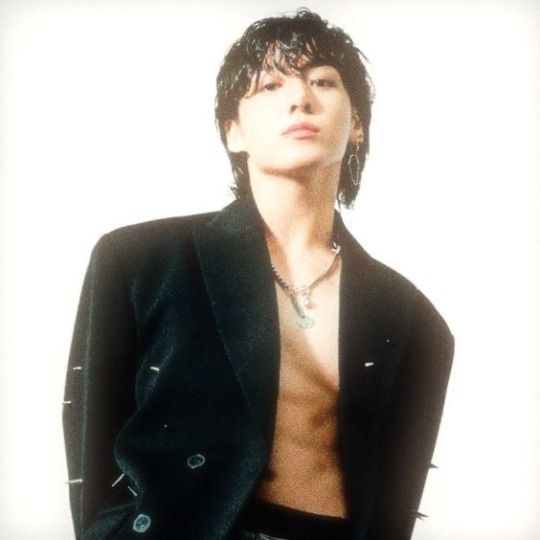

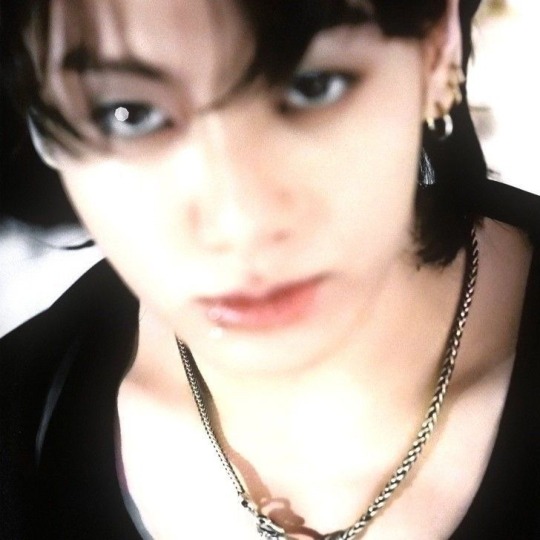

GET INTO IT: feeling carefree each time he traveled shouldn’t be different for jungkook. as much as he wishes to feel like this back home, he can’t help but restrict himself at all times. - one thing about you working abroad and his schedules matching your timezones (better when it hits same destination), he could only wish and live for the best. ‘cause that’s exactly what he’ll get.
pairing: jungkook x reader.
word count: 3.4k
be aware of: graphic smut and unprotected sex (be always safe). reader can’t resist jk, car sex, jungkook smokes here so uhm.. y-yeah..
author’s note: since this is supposed to be a drabble (lol). hopefully my next work will end up being with more than 2k (lol) kisses and let me know what you think 😇. istg this story changed 2837 times hajaja

when you step outside the restaurant walking towards jungkook who’s smoking, footsteps froze at the sudden image.
he smokes? since.. when?
bewildered, you blink twice as your eyes carefully watch him take another hit of the small nicotine. this is definitely a whole new side of him you didn’t know about.. completely new, but it got you confused. you’re not crazy to remember him talking about his hate for cigarettes because of how much his dad used to do it back when he was little.. right? like that wasn’t a dream. you’re pretty sure he has expressed his disgust to you. almost agreeing with you.
sigh..
the more you look at him as you approach him feels like you can’t even get mad at him.
..why? well.. pinocchio wouldn’t be proud of you if you say he didn’t looked hot doing it.
ugh! what are these thoughts!
you definitely despise the smell of cigarettes! you even hate the sight of it, but why does he gives you quite the view? - you blame it on the way he carries himself with so much confidence yet— is so unbothered when he opens his mouth talking with your friends. his outfit too and how an all black combo always look so good on him.. but then, the simplest thing as him holding that tiny folded paper around his pointy and middle finger touching in between his soft and natural pink lips with a very boyish smile almost made you feel like having a lucid dream. why? because.. well, you were definely wet now.
what..? no!
yes, you are. you could feel it now. if only he could feel it through your panties..
mm.. no!!
mm.. yes!! you hated daydreaming fantasies with him like this but your body and mind could be very uncontrollable sometimes. feeling a single drop down your panties.. what can you do now? aren’t you supposed to hate this? you do! but why is your body reacting this way? it’s not wrong but it isn’t entirely right either considering you don’t like cigarettes.
deciding to ignore all the carnal thoughts running through your mind, you keep walking straight to him. as sticky and annoying as it feels.
“so.. is this your way of getting fresh air?” you start as soon as your friends started parting ways. tone rather calm compared to the troubled mindset you had a few seconds ago.
startling him, softly so. “ah.. ha. this.” he responds. eyes blinking on beat as soon as he grins. you watch carefully as his hand shakes the little tobacco rolled paper.
“yeah.. this.” shyly pointing at it, “how long has this being going on?” voice still calm, you didn’t put too much effort in questioning him. it’s his body at the end of the day and you know just how stubborn your boyfriend can get.
“mm..” smoke exhaling from his mouth and he’s mindfully careful when he does it tilting his head up for the smoke to follow that direction and not be even near close your entire face. “not long ago, actually. taehyung once brought this one vaper and i was curious by its smell each time he used it, so I bought one. strawberry ice cream, to be clear,” he laughed, you do too. “it was weird but I liked it.”
“hm..” slowly crossing your arms around your body you lean against his car in thought. not breaking eye contact even a second, jungkook could feel it. “what made you change your mind? m’not gonna lie. I’m surprised. I remember you once saying you hated it.”
and it’s like your gaze is looking for answers and jungkook can clearly see that. knows you too much. thinks it’s so cute too. the way your curiosity rises each time he takes another hit, he can trust your mind being full of unanswered questions for him. he knows what you mean as well as knowing how much you don’t like it either. but the fact that you aren’t mentioning none of it to him it just makes him look at you with nothing more but warm eyes. thinking he loves you too much.
“so do you.” he states by wanting to make that clear. so you know that he knows. so you know that he won’t and isn’t getting crazy about it, that he’s aware. but you could only understand that if he really explained why.
so that’s what he does.
“remember that day when I texted you about living one life?” you nod. “well, I decided to just give it a try. I want to try everything that I can when it comes to things that I want. be it temporally or not. during my whole life.. as long as I live, there’s probably not gonna be a second chance right?”
“right.”
“at least not in this body,” and he’s so soft spoken that when he shakes once more what’s left of the cigarette’s butt before taking his last hit, the sound of a familiar plastic sound resonates through your ears and that’s when you see him pull two tiny tabs of what seems to be gum off his pocket. and you can’t believe he just did that. suddenly the image you were seeing right now, not matching with his current actions. so you can’t help but give a small smile as soon as he handles one tab for you to take with his pretty big eyes.
he continues, “even though it damages my body a little, there’s a balance thing called in life. i’m not getting addicted and I don’t do it excessively-“
“I was worrying about that, actually..” you voice out, interrupting him. “you tend to get obsessive over things.”
it makes him smile, softly. “I know. but I won’t, I promise. you know my thing is drinking alcohol anyways.. even though that isn’t entirely good either..” making you laugh in unison as you lightly punch him.
“at least you’re aware.”
“hey!” he hugs you side ways. “candy isn’t so much good for your health either..” walking towards the side of his car so you can go.
“but i’m not obsessed.” you huff about it.
“could be. you do get a bit obsessive.” bopping your nose.
“stop!”
making him laugh, “okay.. hop on.”
“I hate you.”
“show me how much.” and.. he closes the door with the biggest playful smile.
oh.. no, not again.
and there you are, left with a big hysterical smile plastered on your lips as you try to breath in, breath out the sudden rush of your body. — come on! it’s not as if you weren’t fucking wet a few minutes ago as soon as you saw him do the things you hated the most.. right? ..you totally got this..
but who.. who were you lying to? it’s not like you could control your body when you haven’t seen him in weeks anyways..
yeah.. you were a mess.
still, you tried to play it cool. “are we heading back towards the hotel, right?” genuily asking.
he responds as soon as he closes his door. “yeah, why?” staring at you now. “wanna go somewhere else?” one palm touching your bare thigh when he asks.. you know there’s nothing wrong with it, and it should be normal at this point of your relationship too, but your hormones were getting the best of you so you just play it off, gently pulling his hand away as much as you didn’t wanted to. deep inside.
“not actually, was just asking.” it’s the truth, but jungkook only squinted his eyes before resting an arm on top of the handbrake, his face’s closer to yours. not enough for you to loose your sanity but close enough into getting a whiff of his rich cloudy scent. although, you can’t deny how fine he looked staring at you like that, his eyes always seemed to shine no matter the situation. only that this time around, everything you could sense from it was nothing more than desire flaming throughout his dark orbits.
“you know we can go wherever you want, right?” staying like that for a couple of seconds, all you can answer is a slight nervous “I know.” and jungkook can sense your sudden shyness. thinking is cute but this could only go one way or the other.. if you both play your cards right.
staring at you for a couple of seconds, jungkook’s piercing gaze switch between your lips along with your boobs and neck before getting ready to turn on the car.. making you exhale a little air after, as if you didn’t know you were holding your breath.
“originally, I wanted to get back so I could brush my teeth or something to be honest.” talking about smoking. “I’m not much of a fan of the aftertaste,” he laughs. “but if you want to go somewhere else,” a hand slides through your thigh.. again. only this time, he squeezes it two times. “I’m down for it too.”
one hand on the steering wheel, another one on your thigh.. it’s moments like these when you question if he knows how effortlessly irresistible he is.. sure, it might be something simple. he’s not doing much either. is just that his side profile and the way his hair lingers in his face and overall the way he’s shaped and how you can literally see the bump of his chest pop for how much he works out mark through his shirt that it makes you want to trace his pectorals with your fingers forever makes you want to eat him and that’s it but.. uh, isn’t that the definition of being so stupidly effortlessly hot?
when you softly press both your legs together, his hand seems to scalate close to your inner thigh..
oh jungkook.. perhaps, are you having the same thoughts as me?
still, you try your best to ignore it. “ah.. so that’s why you have gum with you, isn’t it?”
“caught.” rising both hands up as played guilty.
and as you stare at him.. you notice once again, he looked fine. your legs squeeze and you slightly arch your back when your gaze is back on the street still trying to ignore the finest hottie beside you. - jungkook, on the other hand, just smiles to himself and starts driving. you can’t help but give little sneak peeks at the way he gently but confidently grasps the wheel with one hand.. as soon as the other one approaches your thigh once again.. - he always did this but you were uncontrollable tonight. can’t help but immediately give him those eyes as soon as he reaches your beloved red light.
you swore going back to the hotel wasn’t the main priority. you wanted him now. - so slowly tilting your head to the side, your voice is airy when “babe..”
“mmh?”
and that’s when he sees you. you don’t say a word but he already knows what’s that thing you’re craving the most, and that thing it’s him. he doesn’t speak either. just staring at you under the red light, his hand traces a path towards your slowly opening legs. when you bite your lips into a smirk, his fingers are already pushing your panties to the side. confirming his most prominent thought. you’re wet as fuck.
“were you waiting for this?” eyes gazing up and down your body, his voice is cheeky when he asks. biting down both of his lip rings. “fuck. just how long were you this turned on?” playing with your clit “and why didn’t you told me..” as your body twitches. “it makes me crazy..” whispering more to himself.
—
when you’re gripping the head of his seat increasing the pressure between your arms so you could balance your jumps more deeper and precisely above him, he feels like he could cum in any moment. controlling his breathing, he tries to concentrate in order not to but the way your breast bounce and how you manage to leave quick steamy kisses over his neck makes it so hard. mostly when he has this desire to kiss all over your chest and suck on your titties. but his hands are also gripping so hard at the side of the seat, he barely touches your legs and he feels like a teenager are over again.
the fuck is this coming from him not wanting to last? he blames it on the long time you haven’t seen each other. 3 weeks exactly without your kisses and physical touch.. when he remember fucking almost (if not) everyday when you stayed at his house or he stayed at yours. - there’s always this deep desire whenever you’re close to each other, jungkook doesn’t think it will ever go away and to be honest he doesn’t even want it to ever disappear. always thinking about if it’s you, then everything will be okay.
but as you’re both very into it, something similar like a flash, lights up a little the dark street jungkook managed to set you up. - you both ignore it at first but after two more times, you stop bouncing hard on him switching to slow circular movements that still makes jungkook bite his lips for how good you feel.
“don’t stop.” he’s confident, palming your ass.
“I think there’s someone watching us.”
“I’ve notice too.”
but you both end up stopping your movements regardless.
quickly looking around, the flashes has seemed to be gone but as you keep searching for someone, jungkook just stares at you only to caught your attention back by squeezing your ass two times. making your eyes meet as he mischievously smirks.
“I couldn’t care less from last time, you know it.” sensually kissing your lips. he’s provoking you all over again.. “let them have a show. it’s what they want.”
and you know he’s referring to that one time you both fucked on a balcony being overseas too. - paparazzis had caught you fucking and while you were worried about him getting bashed for it (for the blurry clips that spreaded back then), he ended up being so calm about it to the point of fighting with his company saying he shouldn’t feel guilty for wanting to fuck his girlfriend. - and while he understands the depth of why they asked him to be careful, he still thinks it’s just bullshit and that the people who love him for him, will just accept and be happy that he’s happy experiencing what every normal person does. so why everybody can be happy but him? he’s just the same human with needs and desires..
“but this isn’t-“
“stop worrying about me. I know you can’t help it, so let me just say there’s nothing wrong with us wanting to fuck.. I bet they’ve their own experience so why can’t we have ours?”
when you hold his face, you know what he means. knowing how hard it is for him to tell you to stop worrying about it since he once told you he couldn’t just tell that to you because it make him feel careless about your feelings, but you do really get him this time..
when it comes from his personality, a part of you loved that. love that he doesn’t care, love that he always chooses his happiness because at the end of the day he knows he might only have this one life. and even if he don’t, he still wants to enjoy it at his best and that’s why when he motions your hips to move by gripping the side of your waist, both of your bodies stick so close to each other that the image of him biting his lips as he contemplates your body makes you not want to regret this and so you don’t. realizing you’ll only have this from time to time.
“fuck this.” you moan to his ear when jungkook kisses are needy and steamy, confirming just how badly he wanted to try this.
talking about it it’s something but actually experience this feeling of sex in such a limited place (even when this car is very spacious) was really hot and adrenaline reaching. windows foggy and all, it almost feel like a movie. you believe that at this rate it’s even difficult to look at inside the car so if those strangers were really filming or whatever, they’re footage will be already ruined.
you smiled a little because of that. but it didn’t lasted long when you suddenly feel both of jungkook’s hands around your hips manhandling the way you were going to start bouncing on him.
“let them see if they’re so interested in me. I couldn’t care less.” he just doesn’t give a single fuck right now and that only makes you want him more.
see, whenever he’s on his ‘I don’t give a fuck’ moment.. you believe that’s when he’s the most sexiest and dangerous. - maybe you were too into him but each time he showed this side of himself.. you can’t help but love it and be turned on for it at the same time.
—
while he treats you like his personal fucktoy, he does gives you times were you could move at you own pace. but the sounds and the way he touched you were making it hard for you so there’s nothing left when you say, “I- I want to cum.” with such a tiny desperate voice, it makes jungkook grin.
“do it.” voice tender compare with his hot-messy image. “mm, i’ll cum too if you do.” moaning afterwards.
and the good thing is that he really can make himself cum once you do. all he has to do is concentrate in the way your walls contracts into him as if they were gonna swallow, he loves it each time. say it feels too rich, too tight for him to handle. - so when you’re both done, after driving for a while, you don’t see more cars trying to follow you.
“gonna sleep so well tonight, i’m so fucking happyyy” he singsongs as soon as he lays in bed, pulling you into his chest for a hug. “no more nightmares,” he kisses your forehead. “my princess is here.”
smiling to himself, you feel so shy and loved at the same time. gently kissing his lips. “I can say the same.” lovey-dovey eyes looking at him.
he caresses your hair. ”my pretty little princess.”
you smile. “I hope you don’t go hard on yourself.” saying after knowing what’s coming if there really was someone witnessing what happened earlier.
“don’t worry.” softly smiling, “I told you I didn’t cared, didn’t I?” caressing one of your cheeks.
“hm. but still.”
it makes him look at you with warms eyes. “keep being cute. i’m grateful that you worry this much about me..”
“don’t tease me.”
“I’m not teasing you. it’s the truth.” pause. “I just love how caring you are because that means you really must love me..” tone serious.
“of course I do, silly!” you tease him, making him laugh.
“I love you.”
“I love you too.”
“let’s sleep now. we’ve so much things to do..”
“..and so much little time..” you follow.
“I know.” he sighs. “but we can make it.”
“we always do.” you proudly smile, he does too.
“I love us so much.” he says once again.
you laugh. “okay, let’s sleep sentimental boy.”
“you love me this way.”
“you know I do.”
and after teasing each other for a while, you both end up falling into your sleep for a brand new, busy and maybe more exciting day..
#jungkook#jeon jungkook#bts jungkook#jungkook fanfic#jungkook smut#jungkook imagine#jungkook x reader#jungkook drabble#jungkook scenarios#jungkook imagines#jungkook drabbles#jungkook fluff#jungkook angst#jk#bts#bts fics#bts imagines#bts drabbles#bts scenarios#bts angst#bts smut#bts oneshot#jeoncopi
2K notes
·
View notes
Text
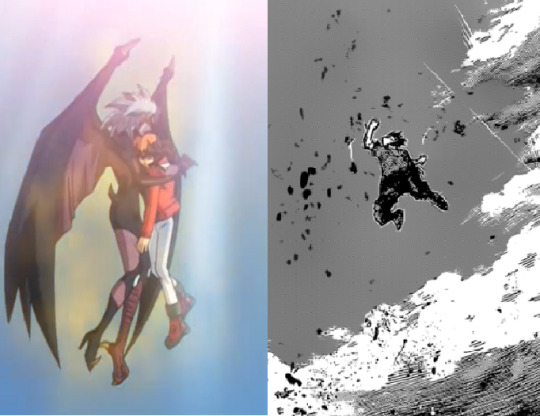
SHIGARAKI VS. YUBEL: HOW TO SAVE YOUR VILLAIN
The failure of Deku to save Shigaraki isn’t just a tragic conclusion for Shigaraki’s arc, it’s also My Hero Academia failing as a story. When I say the story failed, I mean the story has failed to answer any of the questions it asked its audience. It’s themes, character arcs, everything that communicates the meaning of the story to the audience is no longer clear.
Saving Shigaraki was the central goal of not only the story itself, but the main character Deku. By failing in its goal you can’t call this a good ending. In order to illustrate why this goal of saving the villain is so important to both Deku’s character and the central idea of MHA, I’m going to provide a positive example in Yu-Gi-Oh GX were the main character Judai successfully saves their villain. One of these stories fails, and the other succeeds. I will illustrate why under the cut.
BROKEN THEMES = BROKEN STORY
When artists draw they have to consider things like perspective, anatomy, shading, light, coloring. Drawing has rules, and it’s hard to produce good art without knowing these rules beforehand. If I draw something that has bad anatomy, you can criticize me for that.
Writing has rules, just like drawing. The rules of storytelling are important because writing is an act of communication. You can write whatever you want, just like how you can draw whatever you want, but if you break the rules the audience won’t understand what you are trying to communicate.
When I refer to MHA as a broken story, I am referring to the fact that it has broken the rules of storytelling. As this youtuber explains.
“I guess we should first define what broke and broken even means in this context. Has the story turned into an unintelligible mess? Not really. Value judgements aside, the narrative is still functional and fulfills the criteria of being a story. So how can a story that still functions be broken? Maybe to you it cannot. But to me a story that is still functional isn’t enough. What I mean when I say MHA is broken is that it’s lost something crucial. A codifying style of structure, pacing and payoff that until a certain point was the core of its identity.”
I could launch into a long-winded explanation of what themes are, but for the sake of simplicity I like to define themes in terms of “Ask, and answer.” The author asks a question to the audience, and then by the end of the story provides an answer. The audience is also invited to come up with their own answer which prompts them to think about the story on a deeper level. The question both MHA and GX are asking both its main characters and the audience is “Can you save the villain?” with the additional complicated question of “Should you save the villain?” This post will detail how both stories go about answering those two questions, and more importantly why those answers matter for the story.
With Great Power… You know the rest.
My Hero Academia and Yu-Gi-Oh Gx are actually similar stories once you get past their superficial differences. MHA is a story with way better worldbuilding, compared to a society where everything revolves around the trading card game, and people go to school to be better at a trading card game.
However, if you get past that. They are both bildungsroman, stories about the main characters growing up into adults. They both have an academy setting where the goal is for the main character to graduate and enter the adult world. They are both shonen manga. GX is the sequel of Yu-Gi-Oh a manga that ran in Shonen Jump the exact same magazine as MHA. The biggest point of comparison is their main characters, who both start out as young and naive who are driven by their admiration of heroes. Deku is a fan of All Might who wants to become a hero despite not having a quirk, because he loves All might who saves everyone with a smile. Judai’s entire deck archetype revolves around “Elemental Heroes’ and later “Neo-Spacians” who are all based on popular sentai heroes like ultraman.
The central arc for both characters is to grow up. Growing up for both of them not only requires figuring out what kind of adult they want to be, but also what kind of hero they want to be.
Now I’m going to drastically oversimplify what a character arc is.
A character arc first starts out with the character being wrong. Being wrong is essential because if the character is right from the beginning, then there’s no point in telling the story. A character often holds the wrong idea about the world, or has some sort of flaw that hinders their growth. The narrative then needs to challenge them on that flaw. It usually sets up some kind of goal or win condition. That flaw gets in the way of a character “winning” or achieving their goal, so they need to fix that flaw first. If their ideals are wrong, then they need to think about what the right ideals are. If they’re too childish, they need to grow up. If they have unhealthy behaviors or coping mechanisms, they need to unlearn it and require better ones. Otherwise, that flaw will keep sabotaging them until the end.
I’m borrowing the word “win condition” from class1akids here because it’s an incredibly appropriate terminology. Midoriya needs to do “x” in order to win, otherwise this victory doesn’t feel earned. The “x” in this case is usually character development. As I said before, a story where the main character hasn’t changed from beginning to end feels pointless. Especially in Deku’s case, he was already a brave, strong hero who would charge right into battle and defeat the bad guys in chapter one, so him defeating Shigaraki in a fist fight doesn’t represent a change.
The story sets up not only “What does the hero need to do to win?” but also “How does the hero need to change in order to win?” A character either meets these requirements before the end of the story, or they don’t and usually this results in a negative ending.
MHA in its first half quite clearly set up both the final conflict of saving the villains, and also that saving the villains is its “win conditions.” The hero shouldn't be allowed to win without first fixing this flaw.
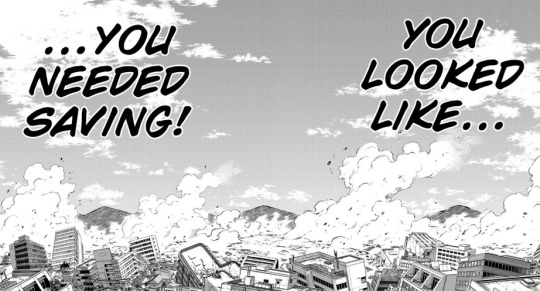
From this panel onward the central question Deku is forced to answer shifts from “Am I strong enough to defeat ShigarakI” to “Can I save Shigaraki?” However, much earlier than that All Might goes on to basically set up the win conditions of what makes the ultimate hero as someone who “Saves by winning, and wins by saving.”
All might: You can become the ultimate heroes. Ones who save by winning, and win by saving.
Therefore the story has set it’s criteria for what kind of hero Deku needs to become. If he wins without saving, then he’s failed to become what the series has set up as the Ultimate Hero.
Shigaraki and Yubel aren’t just narrative obstacles, or boss monsters to be killed like in a video game. They are narrative challenges, which means that the character can’t grow in any way if they don’t answer the challenge presented by the characters. They are villains who actively resist being saved, to provide a challenge for two heroes who define their heroism by saving others. The challenge they pose adds a third question to the story and the main characters.
"Can I save the villain?"
"Should I save the villain?"
"If I don't save the villain, then can I really call myself a hero?"
In other words the decision they make in saving, or not saving their final antagonist defines what kind of hero they are. In Deku’s case it’s even more critical he defines what hero he wants to be because the MHA is also a generational story, and several of the kids are asked to prove how exactly this generation of heroes is going to surpass the last one. The kids growing physically stronger than the last generation isn’t a satisfactory answer, Deku getting strong enough to punch Shigaraki hard is not a satisfactory answer, because we are reading a story and not watching a boxing match.
I’m going to focus on the last two questions though for a moment. Many people who argue against saving villains like Shigaraki argue he is a mass murderer and therefore isn’t worthy of salvation. However, the act of saving Shigaraki isn’t a reflection of Shigaraki himself, but rather the kind of hero Deku wants to be. It all boils down to Spiderman. In the opening issue of Spiderman, teenage Peter Parker is bitten by a radioactive spider and suddenly gains super strength, the ability to stick to walls along with other powers. However, being a teenager he uses these powers selfishly at first. He doesn’t feel the obligation to use his powers for other people, and therefore when he sees a robbery happening right in front of him he lets the robber go. However, because he lets the robber go, the robber then attempts to hijack a car and kills his Uncle Ben in the process. If Spiderman had stopped the robber then he might have prevented that from happening. He had the power to stop the robber, but he didn’t feel responsible or obligated to save other people. As a result Uncle Ben dies. It’s not enough to have power, ti’s how you use that power that reflects who you are, therefore: “with great power comes great responsibility.”
The choice to save Shigaraki actually has little to do with whether or not Shigaraki is redeemable, but rather how Deku chooses to use his power, and what he thinks he is responsible for reflects who Deku is as a person. Deku himself also clearly outlines how he wants to use his power, that One for All is a power for saving, and not killing.
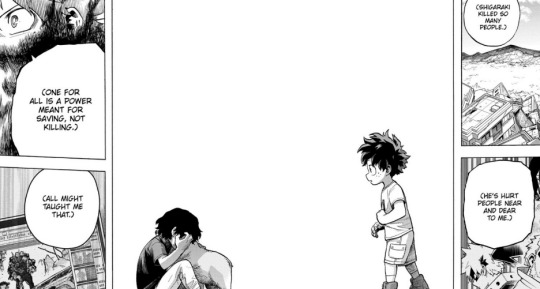
How he uses his power reflects Deku’s ideal in saving others, and therefore if he doesnt use his power to save, then he’s failed to live up to his ideals. It's not whether it's morally right to save a murderer like Shigaraki, but rather the way Deku wants to choose to use his power. It's about whether he feels the responsibility to save others.
Judai explores an incredibly similar arc to Deku. They are basically both asked what kind of responsibilities a hero is supposed to have, which is also a metaphor for growing up to handle the responsibilities of adulthood. As both characters start out with incredibly naive and childish ideas about what a hero is. Therefore realizing what a hero is responsible for is key to them growing as a character. However, Judai is different from Deku. In some ways he’s more like Bakugo. Judai is a prodigy who’s naturally good at dueling. He doesn’t duel to save others, but rather because duels are fun and he’s good at it. He’s very much like Bakugo, who admired All Might as a hero just as much as Deku did, but admired the fact that he was strong and always won rather than he saved others.
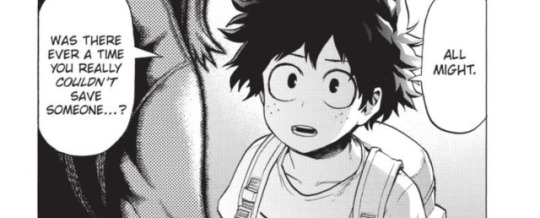
However, I would say both Deku and Judai are questioning what a hero is responsible for. They are both asking if they have the responsibility to use their power to save others. If they have to fight for other people, just because they have power. His first big challenge as a character comes from Edo Phoenix, who calls out Judai for not thinking through what it means to be a hero, and what responsibilities heroes carry. Judai duels because he thinks it’s fun. He will show up to duel to help his friends, but that’s because he’s the most powerful person in the group. Even then it’s because he finds fighting strong opponents to be enjoyable. Bakugo will beat up a villain, but for him it’s more about winning then if the action will save someone or not.
Judai is more often than not pushed into the role of being a hero, he doesn’t play the hero because he’s a particularly selfless person, and he’ll often avoid responsibility if not forced. He has power but no sense of responsibility and the narrative calls them out as a problem.
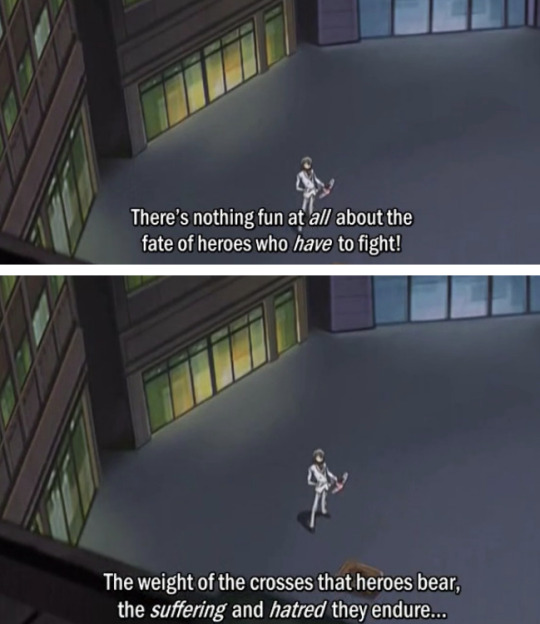
Edo: Can you even fathom that, Judai?
For Judai, he can’t understand the responsibility of being a hero. For Deku, he idealizes heroes so much he can’t understand that there are people out there the heroes have failed to save. These two callouts towards Deku and Judai are discussing similar because they’re both discussing where a hero’s responsibilities lie. Is a hero responsible for saving everyone? Is someone strong like Judai responsible for using their strength to help other people?
Judai’s arc continues into the third season where he’s not shown to just be naive but ignorant. He’s not just childish, he actively resists growing up because he doesn’t want to take on adult responsibilities.
THe same way that Deku just decides not to think about whether or not All Might failed to save people in the panels above. However, in Judai's case he's actively called out for his choice to remain ignorant.
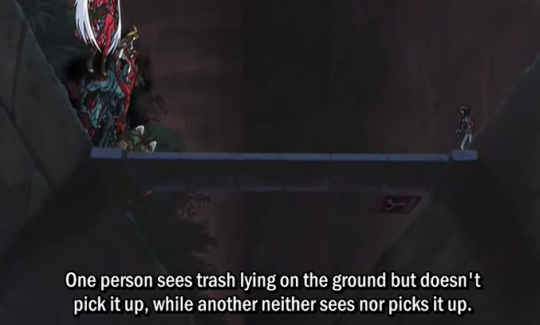
Satou: Now, which one is at fault? Judai: Isn’t it the guy who saw it, but didn’t pick it up. Satou: Not quite. If one is aware of the trash that fell, it may be picked up someday. But there is no possibility fo the unaware one ever picking it up. Judai-kun you are the foolish one unaware of the trash that has fallen. Judai: Are you calling me out for how I am? Satou: Your behavior towards me was atrocious. The worst was attending class only for credit, even if you were there you only slept. Judai: Yeah, I know. I was all bad, but it wasn’t that big a- Satou: It is important. You see, one by one, the students inspired by your attitude were losing their motivation. Now if you were a mediocre duelist, then this would not be an issue. Satou: However, you are the same hero who defeated the three mythic demons. Every single student in the academy admires you. You should have been a model for this academy. Judai: Me, a role model? Are you kidding? I just do whatever I feel like doing. Satou: Great power comes with great responsibility. Yet, as you remain unaware of that, you’ve spread your lethargy and self-indulgence.
seems like a minor issue, but look how Judai responds to the accusations. “I just do whatever I feel like doing.” Satou is arguing that Judai should pay attention to the influence he has on others because of his power, because how he chooses to use that power affects others. However, Judai chooses to actively not look at the consequences of his actions because he doesn’t want to take on that level of responsibility, and therefore he’s looking away from the trash.
While it seems like it doesn’t matter in Satou’s specific example, not thinking of the consequences, or how you use your power can have unexpected consequences. Spiderman doesn’t feel like it’s his responsibility to stop a bank robber, and that bank robber shoots his uncle. You could still argue it’s not Spiderman’s responsibility to stop every crime in the world, and I guess no one owes anyone anything from that point of view - but Spiderman failing to act responsibility had the consequence of directly hurting someone else.
Spiderman has to live with that consequence because it was his own Uncle that was hurt. This is where we really reach the duality of Judai.
In GX, Judai is, symbolically speaking, The Fool of the Tarot Deck, the Novice Alchemist — a person brimming with infinite potential, yet one who is also supremely ignorant, who walks forward with his eyes closed and often unknowingly causes harm in his great ignorance. In this, he is very much the embodiment of the faults we most commonly associate with teenagers — selfishness, recklessness, shallowness, a lack of dedication or empathy when it’s most needed. Like most people, he has good traits that work to balance out some of the above, but his narrative path through GX ends up being that of the flawed hero undone by his faults — and then that of the atoner, the repentant sinner. In his case, the mistakes of his teenage years are the catalyst for his growth from a boy into a man burdened with duty and purpose. Judai is someone with infinite potential, with great power, but also ignorant on how he should use that power, and that makes him an incredibly flawed hero who needs to learn how that power should be used.
Deku similarly exists in a society where heroes deliberately turn a blind eye to the suffering of a certain type of victim. Shigaraki’s speech heavily resmebles Satou’s speech about garbage on the side of the road.
Shigarali: "For generations you pretended not to see those you coudln't protect and swept their pain under the rug. It's tainted everything you've built."
Deku shares Judai’s ignorance, because he’s not only a part of a system that doesn’t even see trash on the side of the road, but he also worships heroes so much that he’s incapable of criticizing them. If Deku saw the flaws of heroes, but at first didn’t have the courage to speak out, but eventually gained the courage that would be one thing. However, if he doesn’t see the flaws of heroes, then the problem will never be fixed.
There are also consequences for both Judai and Deku failing to use their powers responsibly. These consequences take the form of the villains who came about because of all of society’s ignorance to the suffering of victims (Shigaraki) and because of the main character’s ignorance to their suffering (Yubel). Shigaraki and Yubel are also explicitly victims that the heroes failed to save, turned into villains who are active threats to the heroes.
Should I save the villain?
The answer is yes, because the decision to save is reflective of the kind of hero each character wants to be. Each story clearly sets up that Deku and Judai aren’t punisher style heroes who shoot their villains, they are being set up as heroes who save. Deku needs to “save by winning.” As for Judai, a big deal is made of Judai’s admiration for another character Johan who represents a more idealistic kind of hero. Johan unlike Judai is someone who duels with a purpose, something Judai outright says he admires because he’s empty in comparison.
Judai: Johan what have you been dueling for? See, it’s about fun for me… Well, for the surprise and happiness too. I guess I do do it for the fun. Sorry, I guess I put you on the spot by asking out of nowhere. Johan: What’s this about Judai? Judai: It’s nothing. Johan: I suppose there is one goal I have. Johan: Even if someone doesn’t have the power to see spirits, they can still form a bond with a spirit. That’s why I do it for people like him. [...] Johan: I'll fight for everyone who believes in me, and I'll do it with my Duel Monsters. Judai: I'm jealous you've got feelings like those in you.
Becoming a hero who uses their power to help others isn’t just a goal the story sets for Judai, it’s a goal that Judai sets for himself because of his admiration for Johan. Johan represents the idealistic hero Judai wants to be, but is also held back from because of his personality flaws. Johan represents the kind of heroic ideal that Deku is aspiring to be.
Johan’s ultimate goal isn’t punishing the wicked, but to use his power to save others.
Johan: Judai, it was my dream to save everyone through my dueling!
The story sets up the idea that it’s not enough for Judai to simply be strong, he’s also challenged to become a savior who uses his power to help others like Johan. Deku needs to “save by winning” and Judai needs to “Save everyone through his dueling.” However, Johan also adds another condition to what saving means. His idea of saving isn’t to defeat a villain, but rather his dream is to help connect spirits and humans together, even if there are humans who can’t see spirits. Johan doesn’t save people with the power of physical force, but rather the power of human connection.
Should I save the villain?
Here the answer is "Yes", because wants to become more like Johan someone who uses their power to help others not just for themselves. Then we reach the third question
If I don't save the villain, can I really call myself a hero?
It once again comes to power and responsibility. Heroes have great power, and they are responsible in how they use that power, if they use it irresponsibly then there are consequences. Shigaraki wants to destroy hero society, because the heroes irresponsibly use their power to turn a blind eye to everyone’s suffering.
People suffer when heroes fail to live up to their responsibilities. The entire conflict of season 3 is created by Judai failing to save Yubel. If Judai had helped Yubel when they most needed it, instead of abandoning them, then Yubel would never have been twisted by the light of destruction, would never have attempted to teleport the school to another dimension, would never have attacked all of JUdai’s friends.
These consequences matter. Deku can turn his eyes away from Shigaraki’s suffering, but let’s say a hero failed to stop a robbery, or rather he didn’t even try, and because of that his mom was shot and died in the street. Would Deku consider the man who failed to stop a bank robbery a hero? When Spiderman let a bank robber go instead of trying to stop him, was he being a hero in that moment? Both the stories and the characters themselves have defined heroes as people who use their powers to save others, therefore if Judai and Yubel fail to save their villains then they can’t be called heroes by the story’s own definition. Now let’s finally return to the question of "Can I save the villain?"
Was there ever someone you couldn’t save?
m going to start with Yu-Gi-Oh Gx as a positive example of how to save your villain. Gx works for two reasons. One, it’s established from the start that Yubel isn’t beyond salvation, and two, it makes it so Judai can’t win without saving Yubel. The conflict of the story does not end until Judai makes the decision to save Yubel. In some ways the writing is even stronger because Judai is directly responsible for the pain and suffering that Yubel went through that turned them into a villain in the first place. Yubel isn’t just a victim, they’re specifically Judai’s victim.
Yubel is a duel spirit who is also essentially Judai’s childhood friend. A duel spirit just like the kind that Johan wants to save. During their childhood Yubel got too overprotective of Judai, and started to curse his friends for making him cry or upsetting him in any way. Until everyone Judai’s age started avoiding him and Judai became all alone with only Yubel for company. Judai’s decision was to abandon Yubel at that time. He took the yubel card and shot them into space, hoping that being bathed in space rays will somehow “fix” what was wrong with them. I know that’s silly but just go with it. Judai abandoning Yubel had the unintended consequence of Yubel being subjected to the light of destruction, a corrupting light that subjected Yubel to years of pain. This pain literally takes the form of Yubel burning alive.
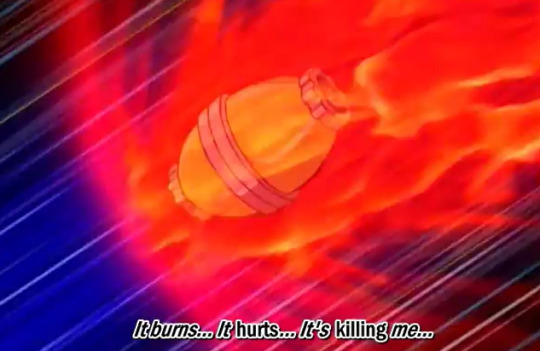
Yubel connected to his dreams called out for Judai every night, only for Judai’s parents to give him surgery that repressed his memories of Yubel causing him to forget them entirely. Yubel then spent the next ten years alone in space, continuously subjected to painful torture, with their cries for help being ignored.
"I was suffering even as you came to forget about me..."
Yubel is then met with the question of how can Judai treat them this way if they loved him so much? As from Yubel’s perspective, they’ve only ever tried to protect Judai, only for Judai to not only throw them away, but subject them to painful torture and ignore their cries for help. Judai effectively moves on with his life, goes to duel academy, makes friends while Yubel is left to suffer in silence all but forgotten. This is where Judai’s ignorance has serious plot consequences.
It’s not just the pain that Yubel endured that made them snap. It’s that their pain went ignored.
Yubel holds out the faint hope that Judai will answer their calls fro help until they finally burn up upon re-entry into earth’s orbit. At which point they’re left as nothing more than a single hand crawling on the ground. Yubel who cannot fathom why Judai would cause them so much pain, and then forget about them, convinces themselves that Judai must be causing them pain, BECAUSE he loves them.
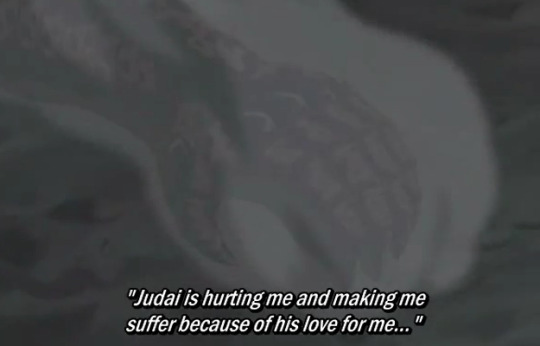
But you see, I couldn't possibly forget about you in the time that I've suffered...
Judai is allowed to move on with his life, to make friends, to spend the next ten years doing so while Yubel is subjected to ten years of agony. When they finally escape their painful torment, they see all the friends Judai has made while they’re left alone and forgotten. However, Yubel’s goal isn’t revenge. Rather, it’s to make Judai share and recognize their pain. WHich is why I said it’s not the fact that they were made to suffer, but their suffering is ignored. Yubel’s entire philosophy revolves around the idea that sharing pain is an expression of love, and that they and Judai share their love for each other by hurting each other.
"That's why I sought to fill all those linked to you, your world, with both sadness and anguish..."
For Yubel, making all of Judai’s friends suffer and Judai themselves suffer is a way of making them and Judai equals again. They want to show “their love” for Judai, but it’s more about forcing Judai to recognize the pain he’s caused them by forcing him through the same pain. Yubel’s philosophy of sharing pain is actually a twisted form of empathy.
They’re not entirely wrong either, that even people who love each other can cause each other pain, and that if one person is suffering alone in a relationship or the suffering is one-sided then there’s something wrong with that relationship.
Yubel: I get it now… You weren’t in love, with Echo. Yubel: No.. you may have loved her just enough to clear the conditions in palace for you to control Exodia, but the you didn’t truly love each other. Yubel: You were only unfairly hurting her, while you stayed unharmed. You wouldn’t suffer. You wouldn’t suffer. You wouldn’t be in pain. Amon: What are you getting at? Yubel: I’ve been hurt! I’ve suffered! I’ve been in pain. That’s why I’m making JUdai feel the same things I did!
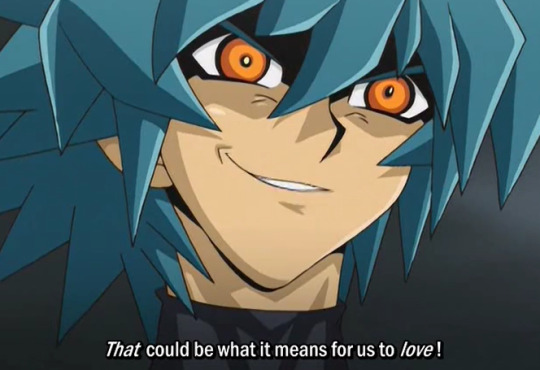
Yubel’s twisted theory of love, is a pretty thinly veiled cry for empathy.
They break out into tears when talking to Amon about the way they’ve hurt and suffered. They clearly state upfront that their goal is for Judai to recognize their love. One of the first things they say to Judai is a plea for Judai to remember them.
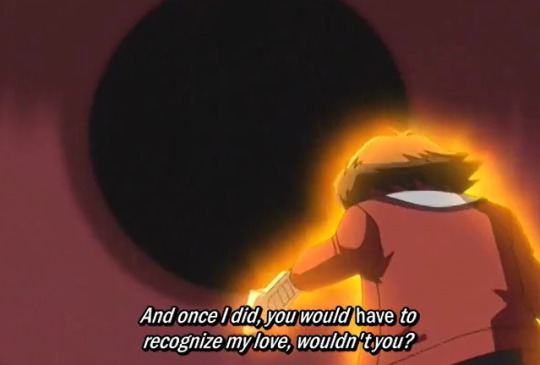
Yubel is presented as a very human character suffering through a lot of pain throughout their entire villai arc, they break down into tears multiple times, they cry out in agony, they're visibly suffering and you see their mental walls begin to break down when Judai denies them any empathy.
Yubel is actually incredibly clear and straightforward about their desire to be saved by Judai. However, Judai doesn’t lift a single finger to help Yubel the entire arc, even though they themselves admit they are directly responsible for Yubel’s suffering but they helped create who they are today.
Judai plunges into a different dimension and gives up everything to save someone, but it’s Johan, not Yubel they try to save. You have Johan, the perfect friend, and perfect victim that Judai gets obsessed over and will not stop at anything to save, and then you have Yubel, the imperfect victim that is actively harming Judai and all of his friends that Judai chooses to ignore. The whole season Judai only focuses on saving the perfect victim Johan, and this is clearly shown to be a flaw. Judai doesn’t just ignore Yubel to save Johan, he also ignores every single one of his friends.
Judai only caring about saving Johan, and deliberately ignoring and abandoning the friends who came with him to help, essentially abandoning them the way he did Yubel leads to another consequence. After he abandons them they get captured, rounded up, and actually die and become human sacrifices.
Losing his friends, causes Judai to snap. Judai becomes the supreme king and decides power is all that matters; he starts killing duel spirits en masse in order to forge the super polymerization card. Which means being left alone, suffering alone, being abandoned by everyone causes Judai to snap the exact same way that Yubel did.
In fact Judai is only saved from his darkest moment, because two of his friends sacrifice their lives, trying to get through to him and appeal to his humanity. At that point Judai’s friends could have just chosen to put him down like a mad dog, to punish him for the amount of people he’s killed, but instead they try to save him because of their friendship.
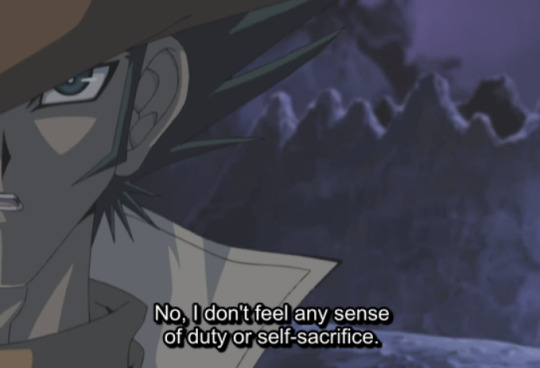
I just want to save my friend. That is all.
By the time Judai is facing Yubel in their final fight, Judai doesn’t have the moral highground against Yubel in any way whatsoever. They’ve both lashed out because of the pain they endured and killed countless people in the process of lashing out. The only real difference between them is that Judai is lucky. He had friends to support him at his lowest point, while Yubel didn’t. Does Judai learn from Jim’s example, and go out of their way to save Yubel the same way they were saved because Yubel is still a friend? Nope, Judai tries to kill Yubel at this point.
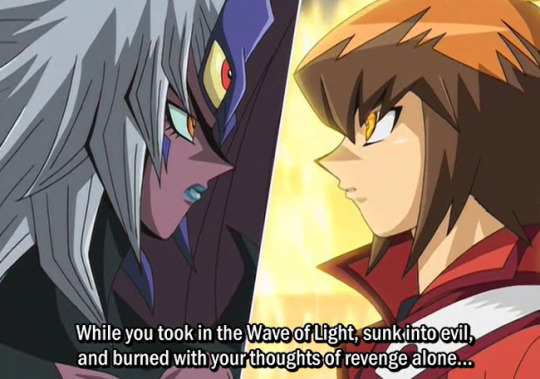
I made a lot of friends... And they all taught me something… real love is wide enough, large enough and deep enough to fill the universe. Your so-called love is only a conceited delusion.
Like, Judai, sweetie baby honey darling. How was Yubel supposed to make friends when they were floating in the empty void of space?
Judai hasn’t learned, they are still ignorant, and still turn a blind eye to Yubel’s suffering. After all if his love is wide enough, large enough,and deep enough to fill the universe then why don’t thy have any room in their heart whatsoever for empathizing with Yubel?
Judai making friends while Yubel was trapped in space doesn’t make Judai a better person than Yubel, it makes Judai lucky. Judai doesn’t even appreciate that luck, because he treats his friends like garbage. It’s not about whether Yubel is worthy of salvation, because Judai is a mass murderer and his friends still went to great lengths to save them anyway. It’s that Judai doesn’t want to empathize with Yubel, because they still want to remain ignorant and irresponsible. Judai wants to continue playing hero, with a very black and white definition of what a hero is. By this point Judai’s killed lots of people, but if he makes Yubel the villain in the situation, he can keep playing hero. He doesn’t have to look at himself and what he’s done, because blaming everything that happened on Yubel and then putting Yubel down like a mad dog allows Judai to absolve his own guilt. Judai practically ignores Yubel’s cries for help, even when Yubel spells it out for them.

I couldn't have lived with the heartache unless I felt that I was being loved...
At this point Yubel themselves acknowledges that their love was just a delusion. That it was a coping mechanism, because they couldn’t live with all the pain otherwise. WIthout it they would have just died, which makes Judai unmoved. The implication here is that Judai thinks yes, Yubel should have just died in that crater. It would have been easier for Yubel to die a perfect victim, then for Yubel to crawl out of that crater and go on to hurt other people. While that may be true the same can be said for Judai - it would have been better if Judai died rather than become the Supreme King. His friends could have put him down like a mad dog, you could have even called that justice - but they didn’t. Judai making no attempt to save Yubel isn’t because he thinks it’s morally wrong to save someone who’s killed as many people as Yubel has, or because he thinks he can’t forgive Yubel, it’s because Judai is taking the easy way out. Johan is a nice, easy victim to save, because he’s Judai’s perfect boyfriend, while Yubel is a complex victim that requires Judai to understand their suffering. Even the act of saving Johan isn’t about Johan himself, it’s about the fact that Judai feels guilt over Johan’s disappearance. What Judai wants isn’t really to save a friend, but to stop feeling guilty over that friend. Judai isn’t just disgusted by Yubel’s actions towards his friend, he also wants to avoid the guilt he feels over causing all of Yubel’s suffering, because it requires acknowledging the complex reality that he is both victim and perpretrator in this case, just as Yubel is both victim and perpetrator.
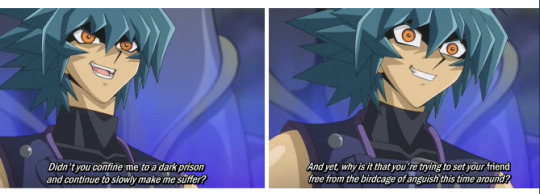
So how can an arc where Judai doesn’t try to save Yubel until the last possible minute, be better than an arc where Deku makes it his goal for the final act of the manga to save the crying boy in Shigaraki?
It’s because the story does not let Judai get away with his continual refusal to empathize with Yubel. Yubel’s entire character revolves around empathy, in the form of sharing pain. As a duel monster, Yubel’s effect is that they are a 0/0 attack monster who is immune to all damage, but when you attack them they deal all the damage back to you. Which means that Yubel will respond to all the pain they feel, by causing you just as much pain in return. Yubel is not a character who can be defeated in a fight, or a duel. In fact they’re the only Yu-Gi-Oh villain who never loses a duel once. The most Judai can do is duel them to a draw, and they draw three times. Yubel wins against everyone else who challenges them. In a way Yubel is like Shigaraki, the ultimate, unkillable enemy that can’t be done away with violence. Judai’s refusal to empathize with Yubel or attempt communication also makes them worse, every time Yubel is hurt they escalate. THe more Judai hurts them, the more they will hurt in return, it’s a cycle that will never be broken simply by killing Yubel, because Yubel is unkillable.
Not only that but the story has gone to great lengths to show that saving Yubel is the correct course of action. If Judai doesn’t save Yubel, he’s basically spitting on the selflessness Jim showed in saving him. In fact if he doesn’t save Yubel, Judai is contradicting his own words on what makes a good friend. Sho once asks Judai after witnessing his brother change, what he should do if a person you lov ehas changed into an entirely different person. What if they're a person you don't even recognize any more? A person you don’t even necessarily like anymore?
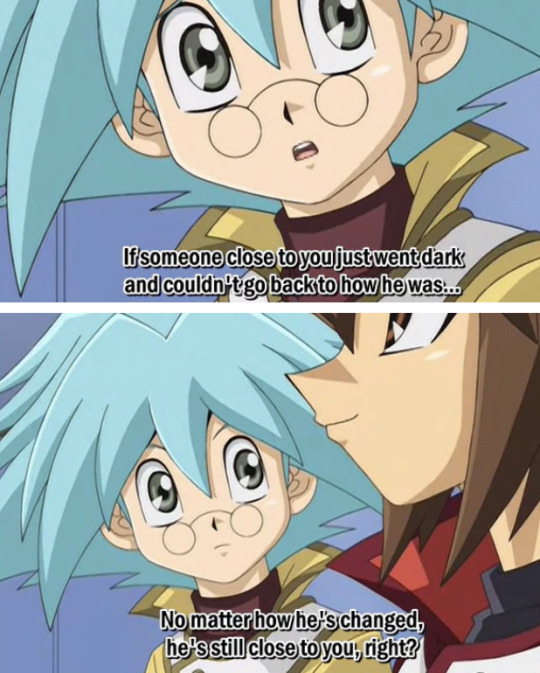
That's why if it were me. I'd probably just be looking after him until the very end, even if I didn't like him. I'd do it cause I think it'd prove that I care about him.
Judai doesn't even say that Sho is obligated to save his brother or morally redeem him, just that he has to keep looking at him instead of turning away or ignoring him.
Judai is being a bad friend, by his own definition. By choosing to deliberately look away from Yubel, Judai’s not living up to his advice for Sho for how you treat people you care about.
Which is why the resolution for Judai and Yubel’s arc is so important, because it’s done by Judai finally acknowledging Yubel’s pain, and promising to watch over them from now on, words that are followed by the action of physically fusing their souls together so they’ll never be alone again. Judai doesn’t just say pretty words about how they won’t ignore the crying child inside of Yubel, but instead he makes a sacrifice to save Yubel at risk to themselves to show their words are backed up by actions. Judai says Yubel will never be alone again, and then he commits.
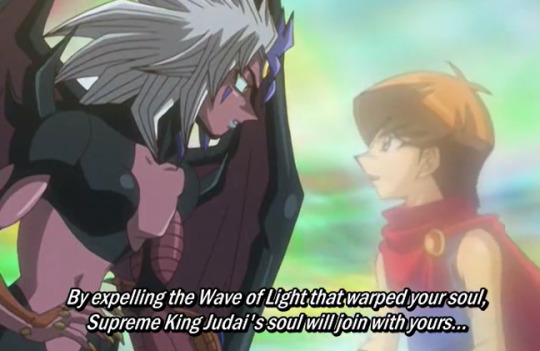
"And even if that means I won't exist anymore... I don't care."
Judai has resolved his character arc by this action, because Judai is finally taking on responsibility and that responsibility is watching over Yubel, so the two of them can atone together. Judai even says himself this isn’t an act of sacrifice on his part, but rather him finally accepting adult responsibilities.
Judai: I wouldn't sacrifice myself for you guys. I'm just going on a journey to grow from a kid into a man.
Judai needed to save Yubel to complete his character arc and grow as a person. If Judai hadn’t saved Yubel, he would have still remained an ignorant child. By learning not to turn a blind eye to Yubel’s pain, and also smacking sacrifices and physically doing something to atone for the way they ignored Yubel up until this point they’ve not only saved Yubel they’ve also done something to address their wrongs. This also continues into the fourth season where Judai’s personal growth results in him learning what kind of hero he wants to be as in Season 4 in order to atone for the spirits that Judai slaughtered, he decides to leave his friends behind and walk the earth with Yubel helping spirits and humans get along with each other. In fact Judai’s final speech as a character isn’t even about how strong he is as a hero, but how weak he is as a person.
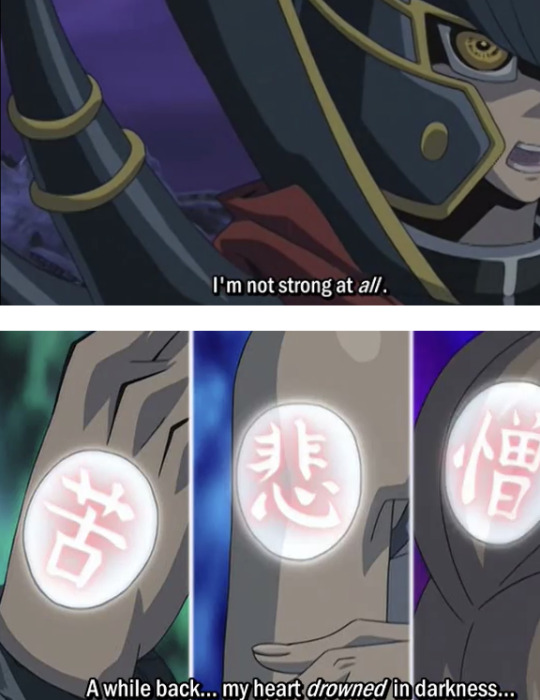
And I put my friends through some rough times. Form that, I figured a few things out... all I can do is believe in them.
The lesson Judai learned is because he’s weak, he needs to empathize and believe in other people the same way that his friends once believed in him when he was at his lowest point. Judai’s not the strongest hero, he’s the weakest one, but that gives him the ability to empathize with people who were lost just like he was, and guide them back from the darkness.
The story of how Deku became the worst hero.
I’m going to say this right now it might turn out next week that Shigaraki is just fine, and he’ll use the overhaul quirk to reconstruct his body. However, even if that happens Deku has completely failed at his goal of saving Shigaraki for the reasons I’ll illustrate below. In theory, Deku’s arc of saving Shigaraki, and therefore winning by saving should be much easier for the story to accomplish and also much less frustrating to watch. After all, Shigaraki has been around since the beginning of the manga, he’s literally the first villain that Deku faces. He’s also the first villain that Deku talks to, where he brings up the idea that there were some people All Might failed to save. There’s also many intentional parallels between the two characters, the entire manga is about their parallel journeys of becoming the next generation hero and the next generation villain. Shigaraki even directly quotes the line at one point that all he wanted was for someone in his house to tell him he could still be a hero, the same line Deku said in the first chapter was that he wanted his mom to tell him to be a hero instead of apoalogizing to him for being quirkless.
Not only is the setup for Shigaraki and Deku made obvious (Deku can redeem Shigaraki by telling him that he can still be a hero too), but Deku himself states out loud that he wants to save the crying child inside of Shigaraki.
Judai runs away from Yubel the whole time, whereas Deku is running towards Shigaraki and actively makes it his goal to understand Shigaraki and continue to see him as a human being rather than a villain. The story also makes it clear that saving Shigaraki is necessary to saving hero society as a whole. After all Yubel is just Judai’s victim. Whereas Shigaraki is the victim of all of society. He’s the crying child who was ignored. The cycle won’t be broken if heroes continue choosing to ignore people like Shigaraki, because more victims will grow up to replace him.
Shigaraki: Everything I've witnessed, this whole system you've built has always rejected me. Now I'm ready to reject it. That's why I destroy. That's why I took this power formyself? Simple enough, yeah? I don't care if you don't understand. That's what makes us heroes and villains.
Shigaraki rejects the world because the world continues to reject him. THe solution to this problem is not rejecting Shigaraki, because Shigaraki won’t go away, the system will just continue to reject people like Shigaraki. As long as heroes and villains don’t understand each other, they’ll keep being forced to fight and the conflict won’t end, because hero society is what engineers it’s own villains.
clear as day by the story itself. If the objective of saving Shigaraki is clear, then how exactly did the story fail in this objective? What went wrong? In this case it’s a failure of framing, and breaking the rules of “show don’t tell.” Stories are all about actions and consequences. When a character makes a certain action in a story, the way other characters around them, the world, and whatever consequences that action frames that action in a certain light. It provides context for how we are supposed to interpret that character in that moment.
For example, when a character does something wrong and another character directly confronts them over what they did wrong, that frames them as in the wrong. The story is criticizing the character for what they did wrong. Context is everything in a story. Stories are just ideas, so they require framing and context to communicate those ideas for the audience. Certain character attributes can be strengths or flaws depending on the context. My go to example is that if you put Othello in Hamlet, the conflict would be resolved in five seconds because Othello’s straightforward personality and determination would have him kill Hamlet’s uncle without questioning things. Whereas, Hamlet constantly questioning and second guessing himself would lead to the worst ending possible. However, if you put Hamlet in Othello, then Hamlet wouldn’t fall prey to Iago’s manipulations, because Othello doubts and questions everything so he wouldn’t believe Iago the way Othello did.
Hamlet’s contemplative and introverted nature can be a strength in one situation, and a flaw in another. Othello’s tendency to act without thinking things through can be a strength in one situation, and a flaw in another. Context matters, because context tells you how you’re supposed to interpret a certain characters actions, and therefore tells you more about that character. This is why people repeat “Show don’t tell” as the golden rule of storytelling, it’s one thing to say something about a character, it’s another to us the characters actions in the story itself to show them something about the character.
What’s even worse then breaking the rules of show don’t tell however, is telling the audience one thing, and then going onto show in the narrative something completely different. In that case the narrative becomes muddled and confusing to read. If I the narrator say “Hamlet is someone who overthinks everything” and then in the story Hamlet walks up to his uncle and kills him with no hesitation, then the narrator is straight up unreliable. It becomes impossible to tell as an author what message I’m trying to get across about these characters, because I’m telling you one thing and showing another.
This is why the writing fails in the second half of My Hero Academia because we are constantly told one thing, but then the story shows something entirely different and sometimes even contradictory to the thing we are being told.
Judai is a much worse hero than Deku, he always runs away from Yubel, and we’re never directly told that he’s supposed to save Yubel either. However, the narrative is incredibly consistent. Judai’s behavior of running away is consistent with his character. All the other character call Judai selfish for abandoning his friends (and they’re not even talking about Yubel). Judai is never painted in any positive light for his actions, therefore we as the audience understand Judai’s behavior is wrong and he needs to fix it. The narrative makes it clear that Judai needs to grow up, and Judai is never rewarded for his refusal to grow up, he’s ruthlessly chewed out, not by his enemies but also by his own friends. However, the narrative isn’t merciless on him either. Season 3 of GX is dark, but it’s not grimdark. Even when Judai loses his way, he’s still shown love and compassion by those same friends who go to great lengths for his sake. The narrative criticize Judai but it never insists that he’s beyond redemption and needs to be put down like a mad dog.
The message is very clear, that not only does Judai need to grow up, but he also deserves the chance to grow and change, which is why he should give Yubel a similar chance. In comparison the story sets out this clear narrative arc for Deku of understanding Shigaraki, but it never challenges him for failing to understand Shigaraki. If you listen to what the narrative says, how other characters describe Deku, and what Deku himself says and only read it on a surface level then yes, Deku’s goal is to save Shigaraki. If you analyze actions however, he is in effect just like Judai he never takes any meaningful action or steps towards Shigaraki, nor does he think of what saving Shigaraki might look like or entail.
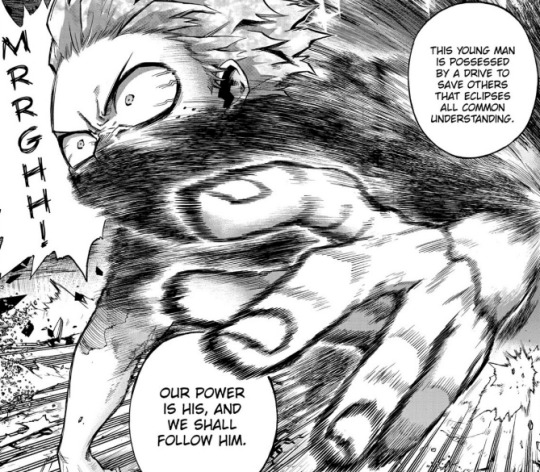
The story describes Deku as someone who is possessed by a drive to save others that eclipses all common understanding, but does the story give us any examples of that behavior?
Judai is characterized as a selfish, irresponsible child, and the story gives us countless examples of his immaturity and how it hurts others. Does the story of MHA do the same for Deku's purported virtues? Let’s run through Deku’s actions, step by step, the actions themselves and how they are framed in order to find any evidence that Deku possesses this drive to save others. Does Deku reflect at all on the question of:
Can Shigaraki be Saved?
Deku leaves on a journey to try to understand villains. When he makes a perfunctory attempt to understand and empathize with Muscle, and Muscle replies that some people are just evil does Deku keep trying to reach his heart? Nope, he just punches him.
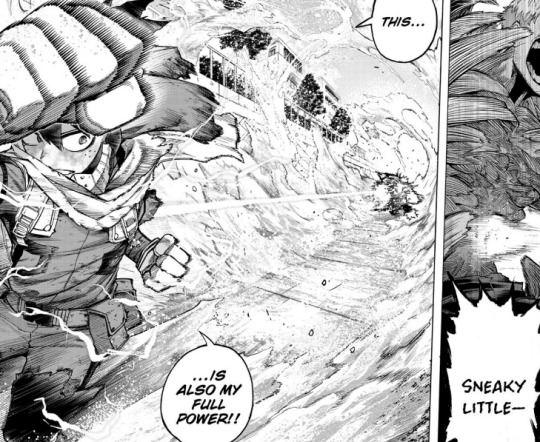
Well, if he’s failed in his goal of understanding a villain then does the story call him out on his failure? Does Deku face any sort of narrative consequence for that failure? Is he framed negatively for failing to understand Muscle, the same way that Judai is framed for abandoning Yubel? Nope. Deku doesn’t express any frustration at all over is inability to reason with Muscle. There’s also no negative consequence for Deku just choosing to punch muscle, it turns out that there was no reasoning with Muscle and some people are just bad eggs so Deku was right. It’s okay for characters to fail, but if a character fails and it’s not framed by the story as a failure then the writing itself as failed. Why even bother to include this scene in the first place if it doesn’t advance Deku’s character in any way? This scene in spite of showing Deku failing to understand someone actively paints Deku in a positive light, because of how much stronger he is ow that he can OHKO a guy that gave him trouble all the way back in the camp arc.
This scene doesn’t tell anything about Deku as a character, it just makes him look cool. In fact that’s precisely the problem, Deku isn’t adequately challenged as a character, because he’s never allowed to fail. Even when he does obviously fail at the things the narrative set out for him to do, he’s never challenged on those failures, because the priority isn’t to make Deku grow, it’s to make Deku look good. As I said before, Judai is the hero because he’s the weakest. Deku is the hero because he’s the strongest. Well, next a big flaw on Deku’s part is that he worshippd the same heroes that were making the world corrupt. Heroes like Endeavor who created people like Dabi. So, does Deku take action to either criticize the older generation of heroes, or separate himself from them in order to try to be better than them? Nope, he teams up with them. Not only that, Deku can’t do something as simple as tell Gran Torino out loud about his plans to save Shigaraki. If Deku feels that Shigaraki is worthy of salvation then he should at least try to make an argument here about his ideal of saving others.
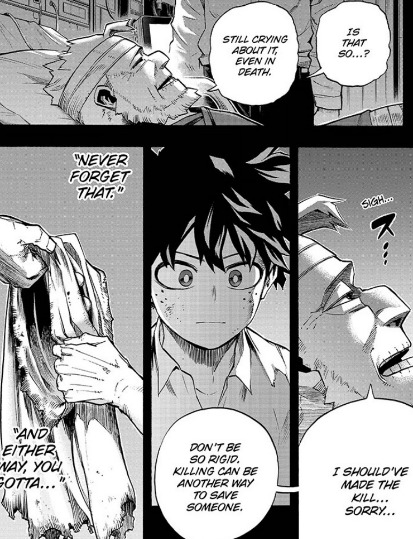
Now here’s the thing, if Deku hadn’t directly looked at the camera and told us he wanted to save Shgiaraki, would we be able to deduce his intentions from his actions? If you took away all of Deku’s internal monologue, and just showed him punching Muscular and saying nothing when Gran Torino says he may have no choice but to kill Shigaraki would anything about Deku’s actions indicate that he wants to save Shigaraki? Let me use avatar the last airbender as a positive example for a moment. People say that Aang’s desire to spare Ozai’s life comes out of left field, but like if you analyze Aang as a character down to their bending, and the way they react in situations they always prefer de-escalation, or taking a third option as opposed to confronting things head on. It’s literally why Toph says Aang has trouble learning earth bending, because as an airbender, he always tries to look for some other way to solve the problem, instead of a direct confrontation with force. As early as season one, Aang tells Zuko someone who has tried to kill him several times that he was friends with someone from the fire nation one hundred years ago and in a different situation they could be friends. Aang’s desire to save the Firelord may not have been told to us until the last possible minute, but Aang’s aversion to violence has always been a part of his character from the beginning. However, Deku never shows any similar aversion to violence. There’s basically no example where he ever tries to de-escalate a situation, or he avoids a conflict by seeking a third option.
Anyway, let’s move onto the next example. In the confrontation where Lady Nagant fights Deku, when Deku learns the fact that the heroes were employing government hitmen to attack people for uhh… exercising free speech does Deku give any reaction to this information? When Lady Nagant says that Deku is only going to bring back the status quo, does he show her any meaningful evidence that he won’t do that.
Deku’s response is because the world is so grey, he needs to extend a helping hand to others. Which you know what thay could be a response. Deku saying that his response to the corruption of the hero world is that he now understands that society led some people down the wrong path, so his way of addressing the wrongs of that society is lending a helping hand to as many people as possible even people he used to think was irredeemable.
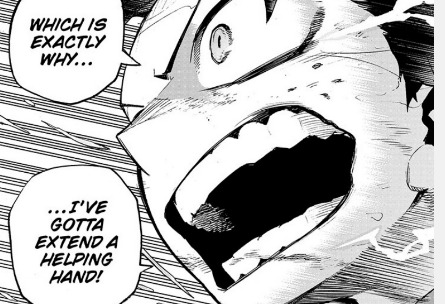
I will give Deku the benefit of the doubt, I think this is an acceptable answer. I can’t save everyone, but that’s not going to stop me from trying to save as many people as possible and maybe I can save people who were this society’s victims on the way too. However, does Deku demonstrate his resolve to extend a helping hand in any meaningful way.
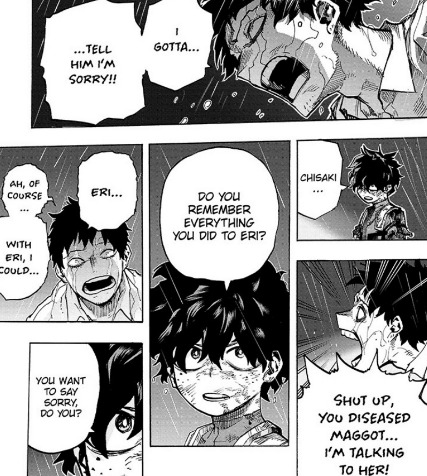
Deku is met with an armless, insane Overhaul who’s begging for someone to help heal his father figure in the Yakuza from his coma. This isn’t like Muscular who insists that there’s no helping him, Deku is met face by face with someone asking him for help. Deku’s gotta extend a helping arm whenever he can, because he knows some people were abandoned and led astray by this society… Unless that person is someone he doesn’t like personally. At which point he only helps them on a conditional basis. We are told Deku will save anyone and everyone, but Deku is met face to face with an armless man who is begging for help and Deku’s does nothing to help him. Deku’s not criticized for refusing to help overhaul either, it’s never brought up again. When Deku begins to experience a mental breakdown because of all the people he’s trying to help in the Dark Deku arc, we are told this is the result of Deku trying to save everyone, but we do not see Deku attempting to save a single villain after Muscular and Nagant.
He exhausts himself beating up villains that AFO sends after him, and only helping innocent civilians. Which would be fine if this arc were about how Deku is running away from his real responsibilities the same way that Judai was running, but that’s not what we’re being told. We are told that this is all part of an arc of Deku learning to understand villains and be a hero.
Deku is asked “Can you save Shigaraki?” by the story, but Deku never at any point has to deliberate on that question. Judai doesn’t deliberate on that question either, but him choosing not to think about things and stay ignorant is the point.
It’s actually fine to make Deku stagnate as a character. It’s fine to have him take the easy way out by just punching villains and giving up on them after one conversation. It’s fine for him to be empathetic to other people’s suffering, or even self-righteous. It’s fine for him to be ignorant.
He could be all of those things if it was a part of a narrative teaching him to unlearn his behavior. In fact the narrative might have been better if Deku started out by saying he didn’t want to save Shigaraki, that there was no choice but to kill him, because then at least his actions would be consistent with his words. Then his lack of empathy and his tendency to resort to violently beating up villains instead of avoiding violence would be character flaws he could work on. Deku however, is presented to us as this empathic hero who is always willing to give others a second chance though he never actually sticks his neck out in order to do so. Continuing on with our slow crawl through MHA, one of Deku’s friends is revealed as the traitor. Deku has a heartwarming scene fo saying that Aoyama can still be a hero, but look at his actions. He lets the adults in the room physically tie Aoyama in a straightjacket and imprison him, for the crime of… doing bad things while he was in a hostage situation. Apparently, if a bank teller helps the bank robber by giving them money when the robber has a gun to his head, the swat team should just snipe the bank teller. Not only does he not defend Aoyama against the adults, or stand up for him, or tell the adults they’re wrong to treat Aoyama a clear cut victim who had a gun to his head and was bing held hostage like he’s a villain - he also lets the adults use Aoyama an innocent victim as bait in order to lure out AFO. Deku tells Aoyama he can still be a hero, but he doesn’t defend Aoyama as a victim of being taken hostage, nor does he stop the adults from further taking advantage of him and throwing him right into danger. Some people are just led the wrong way that’s why they need to be extended a helping hand, but fuck Aoyama I guess. He needs to earn the right to be sympathized with by physically putting his life in danger.
Deku can’t even go out of his way to save a friend who he’s known for the better part of a year, when that friend is a complex victim forced to do bad things.
Then Deku and Uraraka have a conversation where they both, kind of ruminate on the idea that maybe the villains are human beings who are worthy of sympathy.
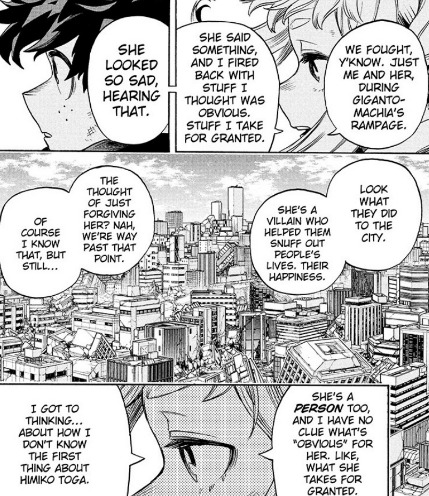
In fact Uraraka is actively trying to dehumanize Toga by looking at the destroyed city, so she won't have to think of Togaas a person.
The language here is also a major fault of this arc. It focuses far too hard on “forgiveness” over and over again. As I said before, saving Shigaraki isn’t about Shigaraki at all, it’s about Deku, and how he wants to use his power as a hero. Deku has even stated himself that he doesn’t believe that OFA is a power that should be used for killing people. So why does whether Toga or Shigaraki are forgivable or not even matter? It’s the same with Deku refusing Overhaul any sympathy. If he’s so morally opposed to abusers, then why does he work with Endeavor and defend him at every visible opportunity, even in front of his victims? Whether or not Deku can forgive Shigaraki doesn’t matter, because Deku is not the moral arbitrator or right and wrong. In fact Deku doesn’t even have any morals, so how is this a moral debate? Is there any point where Deku gives a clear definition of what he thinks right and wrong is? Does he quot Immanuel Kant to the audience?
Batman doesn’t kill people, not because he thinks that every last person on earth can be saved, but because Bruce Wayne an incredibly rich white man thinks that maybe he shouldn’t have the authority to decide who lives and who dies. When Bruce doesn’t kill the joker, it doesn’t mean he thinks the Jokers actions are forgivable, it’s because Bruce thinks it’s not his place to determine whether someone has the right to live.
The whole conflict that MHA presents us is that heroes pick and choose who to save, and only save the ones they deem as innocent. So, how does Deku saying repeatedly they can’t forgive Shigaraki contribute to that theme in any way? In fact by focusing on forgiveness, rather than whether or not he personally has the right to pick and choose who lives and who dies Deku is ignoring the elephant in the room. The question isn’t about whether Shigaraki’s redeemable or if his deeds should ever be forgiven. The question is whether Deku has the right to decide who gets saved and who doesn’t.
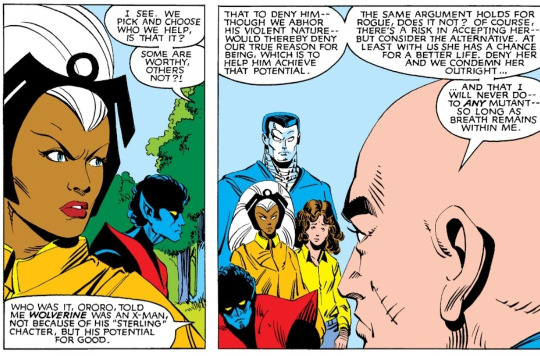
We are told that Deku as a character is someone who wants to save everyone no matter what, so Deku shouldn’t be focusing on whether or not Shigaraki is worthy of forgiveness, he should be making an idealistic argument like Xavier does in this panel. Why doesn’t Deku talk out loud with Uraraka on how he believes his power is for saving others, and not killing? If he’s meant to represent some idealistic hero, then why doesn’t he even talk about his ideals? Why don’t I as the reader know what those ideals are?
I think Xavier’s ideals of forcing the X-men to provide a good example to the mutant community, in order to try to earn the respect of other human beings is wrong, but at least he has ideals. He tries to inspire the other people around him to live up to those ideals. The story can criticize him for his ideals and point out how they’re wrong, while it can also uplift parts of his idelogy like where he believes there are no evil mutants. Deku has a chance to do the same to Uraraka, to tell her clearly, “I don’t think we as heroes have the right to pick and choose who we help…?” but he waffles. Not only does he waffle, but this moment is meant to be read as an indication that both Deku and Uraraka are sympathetic individuals who want to save their villains. They are supposed to look good and idealistic here and they don’t. For Deku it just seems like a repeat of his behavior with Overhaul. The only villains that are worthy of sympathy, are the ones that he personally decides are forgivable.
The story isn’t about whether or not it’s moral to save someone who’s killed as many as Shigaraki has. The story never seriously discusses any sort of complex morality or moral philosophy. Once again to bring up avatar, yes you can argue Aang sparing the life of a war crimminal is bad, but Aang mentions on multiple occasions that he wants to retain the cultural values of the airbending people. Aang has a morality, a consistent morality, it might not be a morality you personally agree with but at least he has one. Deku hates abusers, unless he’s next to Endeavor then he thinks abusers should be given the chance to atone. Deku doesn’t believe that One for All is a power for killing, but he never stands up to any of the adults who are blatantly trying to kill Shigaraki, he doesn’t even express out loud to Uraraka that he doesn’t think heroes have the right to decide who lives and who dies. In fact he’s given the perfect opportunity to, when Hawks kills a villain and it’s broadcast live on the news in font of everyone, but Deku never has anything to say about that. The reason Deku and Uraraka both put such an emphasis on “forgiving” their villains has nothing to do with the story itself. It’s because the author Horikoshi, is afraid that some people will misinterpret his story as saying that he actually thinks that saving a villain like Shigaraki means that he condones mass murder, so he has to have the characters talk about not forgiving Shigaraki.
Judai doesn’t have any consistent morals either, but once again that’s the point and something the story relentlessly calls him out on.
Cobra: Fortune would never smile on a fool like you who fights while prattling on about enjoying duels. Cobra: You are certainly a talented duelist. But you have one fatal flaw. Judai: A fatal flaw? Cobra: Yes, your duels are superficial. Someone who fights with nothing on his shoulders, cannot recover once he loses his enjoyment. What a duelist carries on his shoulders will become the power that supports him when he's up against the wall! Cobra: But you have nothing like that! Those who go through life without anything like that cannot possibly seize victory. Cobra: But I know that nothing I say will resonate with you... because you have nothing to lose but the match. Judai: I... Cobra: Afraid aren't you? Right now, you have nothing to support you.
Judai’s regularly called out for his superficiality. Judai is only a hero because he’s strong and wins fight, he doesn’t feel any responsibility towards other people, and in fact he loathes having to feel responsible for others. Judai isn’t just naive, he deliberately chooses to remain ignorant. Since he’s ignorant of his own faults, he makes awful decisions when it comes time for him to lead, and his friends die because of choices he made. We are told that Deku doesn’t want to remain ignorant, that he wants to understand villains, but Deku’s actual actions are him continuing to ignore society’s ills and the suffering of victims. In fact if you take away Deku’s internal monologue and the narration, Deku’s actions almost exactly mirror Judai’s.
Deku is just as superficial as Judai, and he also doesn't want to spend any time thinking about what kind of hero he wants to be, but the narrative never punishes him for it.
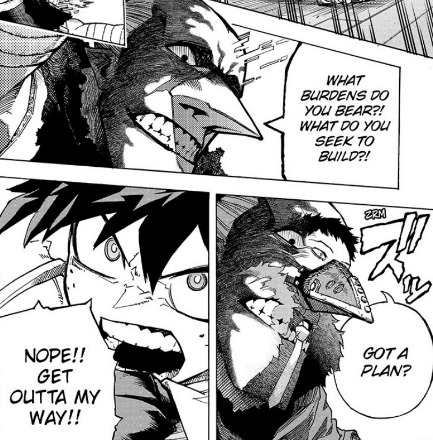
Judai is asked what burdens he has to bear and he has to meaningfull answer that question, Deku is allowed to get away with not having to think about anything. Deku remains superficial. Both Judai and Deku spend the entire arc running away from their villain rather than confronting them in any meaningful way. They both never express out loud any sympathy for their villain, or try to empathize. THey both never step down from the role of hero, and only confront their villain as a hero, because they don’t want to think about themselves as complicit or in the wrong. Shigaraki and Deku’s final confrontation mirrors Judai and Yubel’s but without the same clear framing. THe entire time Yubel is trying to get Judai to empathize with them, and Judai only responds with physical violence, because they don’t want to stop being the hero and because they can’t see Yubel as anything other than the villain. As soon as Deku arrives on the battlefield (by the way everyone else and their mom pointed this out, but Deku who doesn’t think OFA is a power for killing, is completely okay with a plan called the “Sky coffin plan” where every other hero was clearly trying to murder Shigaraki).
When Deku arrives he asks if Shigaraki is still in there, but he doesn’t do anything to try to reach Shigaraki, he jumps right to punching him. In fact he never tries anything besides punching him as hard as possible. How is punching Shigaraki with the force of a thousand suns saving him exactly? How is that different from how he tried to defeat Shigaraki the last war arc, before he saw the image of the crying child that made him want to try a different approach in saving Shigaraki? In Judai’s final fight with Yubel, it’s made explicitly clear that Judai is not trying to save Yubel, and that’s a fault on his part. In fact Judai gives the traditional “I have friends, and you don’t” speech to Yubel but it’s a subversion of how that speech is usually used. Usually that speech is used to show that the protagonist won because of they valued friendship,while the villain treated their friends poorly and only cared about power. However, it’s ironic in this case because Judai got all of his friends killed. Judai treats his friends like garbage. This speech isn’t used to show that Judai is winning because he values his friends more than Yubel does, it shows that Judai is a hypocrite, playing the hero in this situation where they are just as bad as Yubel. Judai’s not morally superior, he’s just lucky that he has good friends. Friends that were willing to save him. The only connection Yubel has to anyone else, Yubel’s only friend is Judai and Judai is a shit friend.
In fact, Mirio tries to give a version of the “You don’t have any friends” speech to Shigarkai, only for Shigaraki to get mad and tell Mirio that he does have friends and people he wants to protect.
This fact is also something that is blatantly ignored by Deku, even though Mirio tells him about it… even though we are told that Deku is trying his best to see the humanity in Shigaraki.
Judai blatantly admits they’re trying to kill Yubel. Which makes them a worse person, but a better character than Deku, because their actions are clearly framed by the narrative and consistent.
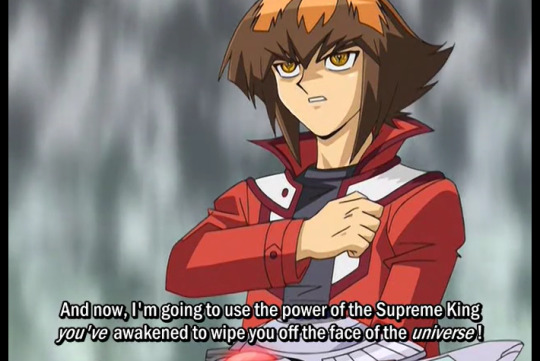
On the other hand we are told that Deku doesn’t want to kill Shigaraki, and yet everything Deku does makes it look like he’s just trying to kill Shigaraki and put him out of its misery. If we didn’t have Deku stating out loud that he wants to save Shigaraki and wants to see him as a human, there’d be nothing in his actions to indicate that he’s trying to avoid killing Shigaraki. Deku says he can’t pretend he didn’t see Shigaraki crying, but like, does he ever hesitate to punch Shigaraki, does he ever think that causing Shigaraki more harm is wrong when he’s already suffered so much? Deku says that Shigaraki is a person but does he treat him like a person? Does he try to talk to him like a person? To use avatar again, Aang does talk to Zuko pretty early on. Deku doesn’t even give the classic “We could have been friends under different circumstances” speech. When Shigaraki resists Deku’s attempts to see him as a person or emapthize with him, Deku’s response is to just resort to punching harder.
Which is in effect the same thing Judai does to Yubel, just kill them as a villain so they don’t hurt anybody else, but framed in an entirely different light. Judai is shown to be ruthless, and cold in his attempt to only settle the conflict with Yubel by violently putting them down. On the other hand we’re being told that Deku is compassionate and empathic while he punches Shigaraki with the force of a thousand suns.
There’s another eerie similarity between both of these final confrontations. At the climax of the confrontation, both Judai and Deku have a psychic vision where they see events from Yubel and Shigaraki’s childhood. This vision is supposed to help both characters understand the good in the villain they’re facing.
Let’s see the contents of this vision and how the visions change each character. Judai is shown a vision of his past life where Yubel sacrifices their entire body, and even their humanity to go through painful surgery to turn into an ugly dragon, all for the sake of protecting Judai in a previous life.
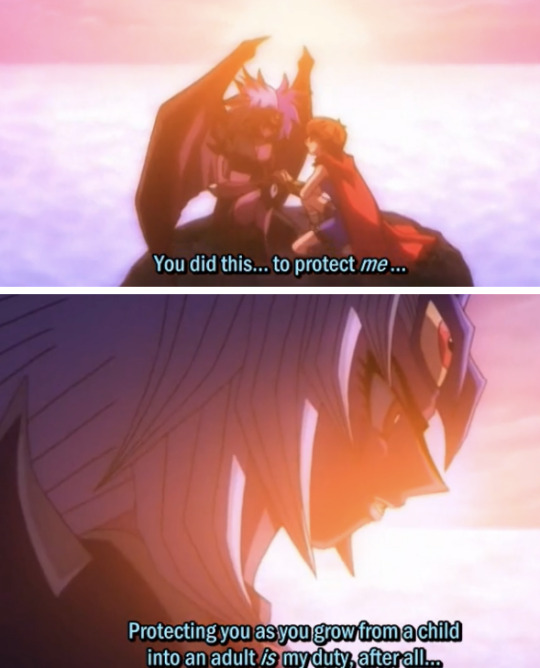
Judai is then forced to witness the good side of Yubel they’ve been ignoring all along to paint them as a villain. Yubel is simultaneously extremely selfish and willing to hurt people Judai cares about, but they’re also extremely selfless and will do anything to protect Judai and have made great sacrifices in the past for Judai’s sake. Deku gives lip service to not ignoring the humanity in Shigaraki, but Judai is literally forced to acknowledge the humanity in Yubel. Not only that, but Judai changes his behavior immediately after learning this new information. After seing the sacrifice that Yubel made for him in the past, Judai responds with a sacrifice of his own. A sacrifice that perfectly mirrors the sacrifice that Yubel once made for him. Yubel gave up their humanity for Judai, so Judai fuses his spirit to Yubel’s, becoming a human / spirit hybrid so Yubel no longer has to be alone.
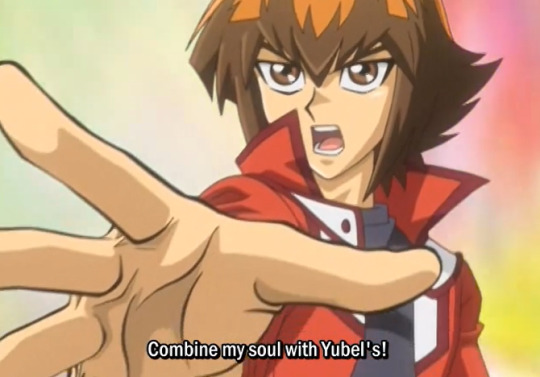
Judai also doesn’t just fuse their soul with Yubel’s in order to stop Yubel from destroying everything, it’s because both of them at this point need to atone together, and Judai is fulfilling his responsibility of watching over his friend until the end to prove that you care about them - as he said to Sho. Judai’s also fulfilling Johan’s dream of helping repair the bonds between spirits and humans, by reconciling with Yubel and repairing their bond. It’s also Judai atoning for his previous behavior of abandoning Yubel, by choosing to stay alongside them as they both atone together. Deku does sacrifice OFA during the fight against Shigaraki, but their sacrifice isn’t to help Shigaraki, but rather doing psychic damage to Shigaraki by using OFA is the only way to defeat them. He transfers OFA in order to break Shigaraki’s brain so he’ll stop reissting and Deku can beat him down. Judai fuses their soul together with Yubel out of empathy and a responsibility they feel to help their friend fater abandoning them, Deku transfers One for All to Shigaraki in order to hurt him and make him easier to punch. It's funny that Deku doesn't travel to Shigaraki's mind to learn more about him, but instead with the specific intent of harming him.
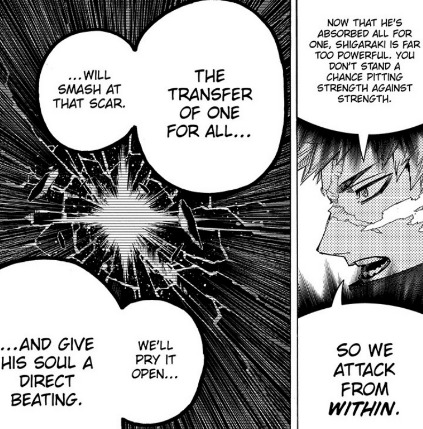
Once he's inside Shigaraki's mind, he doesn't take time to reflect on how Shigaraki used to stand up for bullied kids, or how he wants to be a hero to villains because no one else will stick up for the outcasts in society. No, he only care about Shigaraki when he takes the form of a child crying for help.
In the aftermath of the psychic vision Deku’s behavior doesn’t change towards Shigaraki in any way either. You could say he sacrificed his own arms in order to try to comfort Shigaraki within the depths of his own mind - but that’s not a real sacrifice either because his arms immediately come back. When Judai learns about the sacrifice that Yubel made in a previous life towards him, he stops seeing Yubel as an enemy and finds a way to resolve things peacefully between them. When Deku lanterns that Shigaraki’s a victim of All for One, and that his entire life was a lie, when he sees Shigaraki’s suffering first hand does his beavior twoards Shigaraki change in any way?
When he sees Afo has taken over Shigaraki’s body again, does he try to shout for Shigaraki, to tell Shigaraki to fight from the inside, to reassure Shigaraki that he’s still in there that there’s still good in him? Nope. He just punches Shigaraki some more.
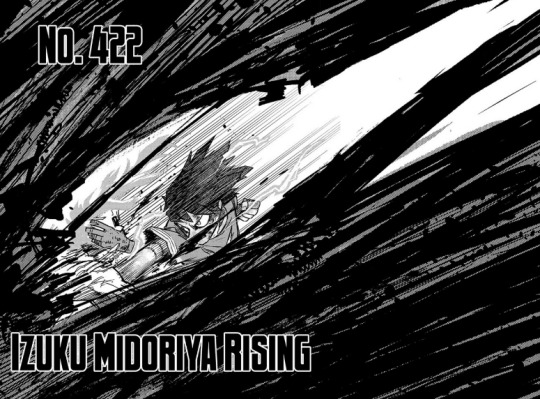
What Deku needed to tell Shigaraki is so obviously set up by the narrative too. Shigaraki wanted just one person in that house to tell him he could be a hero. Deku wanted his mother to tell him he could be a hero if he was quirkless. Deku sees that Shigaraki started out as a boy who wanted to be a hero, and who was manipulated into being a villain but does he try to appeal to the boy inside of Shigaraki by telling him he can still be a hero? Does he now see the good in Shigaraki? Nope, he just tries to kill him by punching him really hard.
I purposefully chose the images for the banner of this post, because it shows how differently MHA and GX treated its villains in the end. Yubel is embraced by Judai in the end, Shigaraki evaporates into dust.
"Judai, now that our souls have become one we will never be separated again. I have now been filled with your love and power. Let us fight together, against the wave of light leading this universe to destruction!"
Shigaraki could so easily have been given the love and empathy that Yubel was shown, but instead their life ends with no show of empathy from Deku, and with them dying believing that their long life of tragedy meant nothing in the end. Shigaraki realizes he's a crying kid, but he's never comforted.
Shigaraki: I only stole my body back from Master, and I didn't destroy anything. "In the end, I was just as you said... A crying kid, huh?"
Yubel is embraced and comforted, Shigaraki disintegrates into nothing.
One of these stories is apparently an optimistic story about heroes saving people, but it ends with the lifelong victim being killed in the most nihilistic manner possible, never receiving comfort, and never achieving anything with his long life.
The other story is a silly anime about card games, shows that when people are alone and suffering they can lash out and do terrible things. That all people are weak especially when they're alone, but the solution isn't to abandon them, or condemn them for their faults, but to believe in them and help uplift them the same way that Judai decides to uplift Yubel so they can atone together.
Which is why Deku gets an F in being a hero. Go directly to summer school. Do not pass Go. Do not collect $100.
#mha meta#ygo meta#mha 423#bnha 423#mha 423 spoilers#bnha 423 spoilers#izuku midoriya#deku#shigaraki tomura#tenko shimura#judai yuki#yubel#soulshipping#yu gi oh gx#yu gi oh
746 notes
·
View notes
Text
Got a Funfetti Universe prompt via DM. This one is for you, astrophile!
Grayskull
William came hurtling through their bedroom door and threw himself onto the top of the covers, breathing hard, his eyes so wide Scully could see all of his sclera. It was early, the light behind the bedroom curtains thin and milky. Mulder had gotten up at 5:00, and she had just heard the shower shut off, could hear the squeaky slide of the squeegee across the glass shower door. It had taken a while, but she had trained him well.
“Is Daddy gone yet?” William panted, the last word of his query coming out on a pubertal crack.
He hadn’t called Mulder ‘Daddy’ since he was six.
Scully scooted herself up to sit against the headboard.
“What?” she asked, awake, but not as alert as she would be after her first cup of coffee.
“Dad,” William said again, his face pleading. “Has he left yet?“
“Have I what yet?” came Mulder’s voice from the en-suite doorway, tucking in the top of the towel he’d wrapped around his waist.
“Dad!” William said, rolling awkwardly off the bed and then throwing his substantial thirteen-year-old frame against his father’s still-damp chest.
Mulder wrapped his arms around the boy and threw Scully a questioning look. She gave him a mystified one back, shaking her head.
“Will?” Mulder said a moment later, trying to pull back from his son’s death grip to get a look at his face. “What’s going on, bud?”
“I had a,” the boy paused briefly to swallow, and finally lifted his eyes to look up at his father. “I had a dream,” he said. “That you got killed. On your trip.”
Sweet boy , thought Scully.
Mulder shot a look toward the packed suitcase that waited by the bedroom door. He had a flight out of Dulles in three hours.
“It’s okay,” Mulder said softly, rubbing the felty softness of his son’s back.
Scully gave him a ‘come here’ gesture, and Mulder started walking his son backwards toward his mother’s side of the bed.
“Why don’t we sit down,” he said. Scully shifted in the bed to make room for the two of them to sit. The bed dipped under their weight, and Mulder raked a handthrough his still-wet hair. Scully reached out and put her hand on William’s shoulder.
“It was just a dream, sweetie,” she said.
“It wasn’t, though,” William said, glancing at the suitcase.
“It wasn’t a dream?” Scully asked softly. She could feel the boy’s heart pounding against her hand.
“It was a dream,” William said. “But it wasn’t.”
He looked pleadingly at Scully, who was struggling to understand.
“What do you mean, Will?” Mulder asked.
William turned back to his father. He took a deep breath in.
“You can’t go on this trip, Dad. You’ll die.”
A coldness spread through Scully’s abdomen.
“You’re having a premonition?” Mulder asked gently, bending his head down to try to look at his son from his own eye level.
“Define ‘premonition,’” Will said.
“A strong feeling that something will happen,” Mulder said. “Especially something unpleasant.”
“It’s more than that,” said Will. “It’s more than a feeling.”
The sun was coming up, slowly brightening the room.
“Grayskull?” Mulder asked, their codeword for William’s powers. He’d come up with it at age seven, after watching an old He-Man cartoon. Elated by the idea of Prince Adam’s powerful alter-ego, he’d shouted “By the power of Grayskull!” and proceeded to lift the coffee table three feet off the ground with his mind. Scully, surprised and afraid and still managing to hold onto some semblance of parental authority, had bleated “No Grayskull in the house!” and a codeword was born.
“Grayskull,” William confirmed.
Mulder exchanged a look with Scully over their son’s head. “You’re sure?” he asked the boy.
William nodded pointedly.
In the kitchen, the coffee maker turned on and the sweet smell of roasted beans drifted into the bedroom. The three of them sat in silence for a moment before Mulder ran a hand thoughtfully over his chin.
“What will happen?” he asked. “If I go?”
William ran his palms over his knees a couple of times, staring down at the floor.
“The arrest goes bad,” he finally said. “The guy you’re going after, he has a gun. Hidden. Up by his neck. When he’s ordered to put his hands behind his head, you and the other agent–the one with curly hair and the gap between his teeth?”
Mulder’s Adam's apple bobbed. William had never met any member of the Violent Crimes task force that his father was currently assigned to.
“Jacoby,” Mulder said.
“Him,” William said sadly. “When you and him go forward to frisk and cuff him, he draws on you.”
Scully could feel the blood drain from her face. Her eyes bore holes in the side of Mulder’s head, but he was focused on his son.
“Don’t get on the plane, Dad.”
The boy had shown an aptitude for both telepathy and telekinesis–amongst other alarming capabilities, but this was something new.
“I’m going to call Skinner,” Mulder said. “Let’s…Let’s huddle up in the kitchen in a little bit. We’ll…figure this out.”
Scully finally caught Mulder’s eye and he nodded at her.
“Why don’t you go brush your teeth,” Scully said to her son as Mulder rose from the bed and grabbed the cell phone sitting on his bedside table. William watched as he closed himself into the bathroom.
“He can’t go, Mom,” the boy said, standing. The flannel pajama pants he was wearing were faded, and his ankles were slowly creeping farther and farther below the cuff. “You can’t let him.”
Scully pulled her lips in between her teeth and gave her son a small nod. He drifted out of the bedroom and down the hallway.
Following him a moment later, Scully rose and shut the bedroom door. After a few minutes, Mulder emerged from the bathroom with the cell phone in his hands.
“I told Skinner something came up and I couldn’t make the trip.”
He pulled the towel off of his waist and stepped into a dark pair of boxer briefs.
“Good,” Scully said. Mulder gave her a surprised look.
“What?” she said, hugging her arms to her body. “I know this is usually the part where I tell you that precognition violates the principle of antecedence, and that an effect cannot occur before its cause. But I’m relieved as hell that you’re not going.”
Mulder lowered himself to sit on the bed. “And here I had an argument all prepared.” He reached down and spun the platinum wedding band he wore around his finger a few times. “Precognitive phenomena,” he said, a little awe in his voice. “Christ.”
“What did Skinner say? Did you tell him it was Grayskull?”
“I did. And not much. He reminded me that it wasn’t his op and that I’d have to make my excuses to the Deputy Director, but that he’d smooth things over.”
“Josephson’s Method for verifying precognitive dreams necessitates a complete blackout. Your talking to Skinner may have negated our ability to collect scientific evidence. Procedurally, a dream or vision can only be identified as precognitive after the putative event has taken place.” She had, almost against her will, become something of a renowned expert in paraphsycology over the course of the last several years.
“Fuck the data collection,” Mulder said. “It’s not like we’d try to publish. Anyway, Jacoby’s got a new baby at home, I’m calling the SAC with a request to cancel the op.”
“Think you can convince him?”
“Her.”
“My question stands.”
Mulder rubbed a hand over his eyes tiredly. “She’s ambitious. My guess is no.”
He reached again for the phone.
“I’ll get our guy started on breakfast,” Scully said, sliding her feet into slippers and closing the door softly behind her.
When Mulder joined them later in the kitchen, Scully handed him a steaming mug and raised her eyebrows in question. Mulder shook his head.
From the small kitchen table came William’s voice.
“Call Jacoby. Tell him to be careful.”
***
Two evenings later, Skinner showed up at their door in his jacket and tie, overcoat billowing in the wind. Scully opened the door wide to admit him.
“I can’t stay,” he said, ducking under the lintel.
“Hey Uncle Walt,” called out Will, who was on the couch relacing a baseball mitt.
“Heads up, kid,” Skinner said and tossed a small box covered in gift wrap over the back of the couch. Scully thought it hovered in the air maybe a second too long before her son dropped the mitt to the couch and grabbed it.
“It’s not my birthday,” the boy said, looking up.
“It’s a thank you gift,” Skinner said gruffly.
William tore open the paper.
“Is this the new Assassin’s Creed?” he asked the older man, his tone one of exhilaration.
Skinner nodded.
“Can I?” William asked his mother, practically vibrating with excitement.
“Go ahead,” Scully said. Before she even finished talking, the boy was halfway up the stairs.
Mulder had made his way over to the entryway. “The Op?” he asked the second he heard William’s bedroom door close.
Skinner turned to him. “Went down.”
“And?”
“He was right,” Skinner nodded toward where William had disappeared up the steps. “Holschu had a gun. Newfangled holster at the base of his neck. It was a shitshow.”
“Anybody get hurt?”
“Holschu’s dead. Jacoby got hit.”
Mulder and Scully shared a look.
“How bad?”
“He took your warning seriously,” Skinner said, turning toward the door. “He’s going to be okay.”
Scully reached out and squeezed Mulder’s hand.
Skinner paused in the doorway. “Grayskull,” he said, and Mulder and Scully looked at him intently.
“You keep a tight lid on this one,” their former boss went on, his voice weary. “Rumors turn into whispers.” He smoothed his tie with his left hand. “And a lot of people are listening.”
77 notes
·
View notes
Text
Any advice for handling race in reincarnation situations?
@swamp-spirit asked:
I'm writing a story that includes characters being reincarnated with completely different appearances. It's a fantasy world, and most of the characters are being reborn in the same region, but I still want a range of skin tones and features in the main cast (this is a comic). I have weird feelings about a character being 'reborn' with notably lighter or darker skin, but it also feels implausible and lazy for people to Just Happen to have a similar appearance when the theology of the story doesn't support it. Characters being reborn, and taking out things specific to real life groups, what are the major things you'd want an author to read up on or take into account? (Note: there is not a 'white' looking ethnic group in this story)
I don’t think it’s a problem as long as the skin tones don’t have any correlation to the circumstances that they’re reincarnated into.
- SK
It’s an interesting question, because in most religions where reincarnation/ transmigration of the soul is a feature of “what happens after death”, remembering one’s past life is not really part of the package deal. From what you’ve written, it’s not clear to me where the “memory” of these characters’ lives are held. Is there a 3rd person omniscient narrator telling the audience who each person is in their next life or do the characters themselves retain memory of past lives?
Assuming this is your typical reincarnation scenario where characters retain no memory of previous lives, it doesn’t much matter. The next life is the next life. Who a person was in their previous life and that identity, in theory, means nothing to them. This also means whatever personality, values, experiences and so on they had in their previous life no longer has meaning. They are, in effect, another person. However, you say you feel awkward about the above which makes me wonder if characters are remembering past lives, in which case…
If you study pretty much any major Asian religion where reincarnation is a part of the belief system, having no memory of the previous life is par for the course. In present-day religions like Jainism, Sikhism, Hinduism and Buddhism, only “special” (I’m using the term very casually here) entities like bodhisattvas, guru, arihant, buddhas, etc. usually get to keep their memories, while the rest of us (literal) mere mortals are supposed to lose our memories between lives as a part of Samsara. In Hinduism, even the gods often forget their previous lives, unless their reincarnation had a targeted purpose (Like being born to defeat an evil entity).
For most people, it is only through prayer, devotion, meditation and accumulated virtuous/ good/ compassionate deeds that humans are thought to deepen their understanding of the nature of the universe, and thus have the capacity to remember past lives (I’m, again, paraphrasing very loosely here from several years worth of university history+religion courses).
This is why the isekai genre in Japan is largely regarded as a “cheat”/ parody genre of fantasy. The protagonist, according to common Japanese cultural beliefs, which are quite heavily grounded in Buddhism, is definitively “cheating.” Not to get too ironically biblical, the character’s success often comes from the forbidden knowledge borne of their previous life.
Thus, there are two ways I look at your characters’ predicaments:
It’s not technically reincarnation - not by the way most major world religions define reincarnation, anyway. You have people who died now inhabiting other bodies, but that’s not the same as the transmigration of the soul. Also, you want to delve into the weirdness (and maybe heaviness) of “Wow, I went to sleep with one face and woke up with another.” There are certainly stories about people who have had dramatic cosmetic plastic surgery, weight loss surgery, HRT, etc. and then experienced the difference in the “before” versus “after” of how their altered physical appearance makes them feel, as well as how other people treat them. Even if the community your characters are born into now differs from their previous community (Which I guess would make this more a “I traveled between dimensions, and my appearance altered in the process” sci-fi adjacent affair), their new life will still have social environments with differing attitudes towards human physical appearance that will affect your characters’ emotional states.
Isekai it up and play with the ridiculous contradiction of having past lives and differing memories of one’s appearance. Isekai manga, manhwa and webtoons all make use of this trope heavily, especially with protagonists who experience a “glow-up” (Ex. Going from a Plain Jane OL to beautiful fantasy heroine) or, by contrast, protagonists who end up in very different forms from their original lives (Tensura, I’m a Spider, So What?). I’d be creative and go even more granular. Being able to tan after a lifetime of getting sunburns or no longer needing glasses might be nice, but what if the new body lacks the enzymes to process dairy or alcohol? What about dealing with differences in hair texture? Skincare routines? What about living life as a very tall person after being quite short or vice versa? What if you bumped into an acquaintance from your previous life, and one of you clearly got a more “coveted” reincarnation? See how far of an extreme you can take this idea until it feels too uncomfortable or ridiculous.
Marika.
434 notes
·
View notes
Text
I was thinking a bit about character development.
Like, Cale, Choi Han, and Alberu have a beautiful friendship - and it grew over the course of the entire story.
I'm probably going to talk about later parts of the story, so Imma put the rest behind a divider so you can avoid spoilers
In the beginning, Choi Han was loyal to Cale but .. it was kind of shallow.
Choi Han didn't understand why they had to wear those shitty Arm robes, was shocked when Cale created his alibi by drinking, and so on and so forth.
He followed Cale, but he didn't really know Cale that well yet and that was clear.
Oh, and it was much more of a hierarchical relationship. Cale as his legs, Choi Han as Cale's knight.
This slowly began to change, though I think there were a couple of key turning points.
Cale almost dying after the Battle of the Gorge was one of them.
I think that's when Choi Han truly realized he couldn't trust Cale when it came to his health. Not that he hadn't seen signs before, but Cale always brushed things off and I think this was when Choi Han realized that no, it's really not okay, no matter what Cale says.
After that, we see Choi Han start asking more questions...
And Cale (with a clear flashback to his time as a team leader, where his people desperately wanted to help more) actually answered them.
The relationship started to shift, and become less liege and knight, and more colleagues. (This, btw, came from both of them. Choi Han asking more, and Cale telling more. Somewhat. A little bit.)
They definitely grow closer in other ways - Choi Han telling them about his long life after they found the Dragon Village, for example. (Though Cale already knew it, so you also see just how much Cale is still keeping his secrets).
And then...
We get Choi Han receiving Choi Jung Soo's memories.
That causes the biggest shift yet.
Now they aren't just liege and knight.
Now we have Cale thinking of Choi Han as his best friend's elder (even if Choi Han doesn't feel a need for that).
Also, Choi Han now knows. Not just that Cale is a transmigrator, not just about his life as Kim Rok Soo, not just about the cataclysm (and what happened to the Choi family).
He also knows about the tragedy that has pretty much defined Cale. He may not know about the aftermath, or Cale's time as team leader, but he knows that Cale was devastated after losing everyone.
We also see Choi Han (who got Syrem's ancient powers and now knows what it's like to use them) insist that Cale shouldn't absorb the Blood-drenched Rock power, a potential standoff that ended when Cale found another way and used Embrace instead.
They are no longer liege and obedient knight.
And then came the sealed god's test, where Choi Han gave up quite a lot of his potential lifespan, just to join Cale in one of the worst times of Cale's life.
And he was happy for it.
We see Cale truly overcome with emotion. The trust and friendship between the two of them is just beautiful.
And I truly meant to talk about Alberu as well (him joining them also adding to this) but I only realized when writing this just how much I had to say about Cale and Choi Han, so maybe I'll do that another time.
Anyways.
That still wasn't everything. Because we also had the indignity test...
And while I think the author didn't fully finish everything Choi Han saw because it'll probably come up in part 2 (it hasn't yet, but I think I see the author building up to something. Because so far they've all been too busy to really address a few things, plus apparently there's dragons dealing with time? Anyways, I suspect we'll get more on Cale's childhood, and what Choi Han knows, and some other things, but we'll see. It took almost 300 chapters in part 1 before we got all the amazing scenes with Cale and Choi Han and the sealed god's test and instant so I'm willing to let the author build things up again.)
Oh, sorry. What was I saying? Right.
Even though we don't have the full story, we know that Choi Han knows.
And in one of the side stories, he says this:
He didn’t know at first, but that person’s days of rest that Choi Han saw was more of a period of recovery than days of rest. Of course, the person himself thought that he was playing around, but it did not seem like that to Choi Han at all. That was why his people, who at some point realized the meaning of this rest day, tried their best not to bother his recovery.
And again, in the same side story but referring to a moment later in part 1
Cale was mumbling. “Haaaa. It’d be great to be a slacker.” Choi Han knew the meaning of those words. ‘I want to rest. I need to heal.’ That should be the meaning. However, he now knew what Cale would say after that.
And skipping the specific details, what Choi Han probably meant when he said he knew what Cale would say after that
Cale looked toward the east and calmly commented. “There are too many things to do, so I can’t rest.”
Choi Han understands Cale 1000x more than he did when they started.
And Cale understands Choi Han better, too.
Which is probably a topic for a whole other post, considering Cale initially almost seemed to put Choi Han on a pedestal as the hero and protagonist of the story.
#tcf#lcf#trash of the count's family#lout of the count’s family#cale henituse#choi han#tcf novel spoilers#totcf
197 notes
·
View notes
Note
No one can convince me Sasuke constantly asking Naruto why he cared wasn't him searching for a confession. There's a reason why there was a pause before we said friend. It's a popular literary device to indicate uncertainty. People are acting dense on purpose.
In most Shounen or JP media, friendships can be very deep yet straightforward. It is very rare ever to find characters in a platonic relationship who question whether the term 'friends' accurately defines their bond.
Even before Sasuke himself puts forward the question, many characters question Naruto about his fixation on Sasuke , it is obvious that the relationship between them does not fit the norms or definition of friendship even in the setting itself.
I remember seeing this from Japanese users on a 2channel thread, on Naruto's homosexuality. Even though a lot of the users' responses have an underlying homophobia to it, they do acknowledge the obvious.

>The way Naruto and Sasuke are portrayed is not normal no matter how you look at it. But I guess that's just the way it is.
But what I don't understand about Kishimoto is that not all of Naruto's relationships are like that. He can also portray warm and good friendships like Shikamaru and Chouji, Sakura and Ino, Kakashi and Gai etc.
Also, in the manga itself there are a lot of comments like " what on earth are they doing ?" Which makes me think that the author is able to look at things from an objective point of view
They agree that not only Naruto-Sasuke's relationship doesn't fit into the norms of friendship/brotherhood like other characters but that Kishimoto deliberately made it such.
In the Western fanbase, in recent years, even the dudebros are now starting to admit how gay the relationship was, but there are still a lot of people who insist that people cannot conceive of a deep friendship between men and that fujoshis are sullying their relationship. But Naruto and Sasuke's relationship being abnormal is pretty much an accepted opinion in Japan even though it's not discussed as much, it's an open secret.

> I'm wondering why it's so popular overseas, when the love between the men is so intense.
I guess most people got into it initially because of the ninja element.
It has been my favorite anime for many years and it still has support from young people in many countries.
The relationship between these two is too heavy that it is often made fun of, but I can't mention it publicly
I'm wondering if there's people out there who have had similar feelings, although not to this extent.
"why it's so popular overseas, when the love between the men is so intense"
Oh brother. Because they ignore it altogether to focus on one of the worst aspects of the series: ridiculous power creeps and make everything about power scaling.
So yeah, the text quite literally tells us that Naruto and Sasuke's relationship defies the conventions of friendship. By the end, even Naruto drops the label of brothers to describe the relationship even if he had once used it to describe their bond. Naruto then only describes his own feelings but doesn't categorise it and only then Sasuke is satisfied.
91 notes
·
View notes
Note
Uhm...hello...oh my god, okay, this is my first time doing this so I probably should apologize in advance for I just know this is going to be a big yap session (there'll definitely be a question, trust).
I'm rather new to the KnY fandom so I haven't really completed the manga yet (as in, analyzed it) although I've gotten all the Spoilers I could get. I've read the light novels to an extent, too)
Sanemi really became my favourite character although it was a connection I couldn't really explain or express since he unfortunately remains one of the most hated characters in DS, and yes I began shipping Giyuu x Sanemi even though many people seem to think that's weird and came out of the blue.
A Pinterest pin with a link to your page; a post where you had a theory that Sanemi had some form of anxiety...and boy am I grateful to the person who made that post, I've been hooked to your blog ever since.
So, uhm, first of all let me just say that I love all your writings. They're convincing, elaborate, and the amount of research you've put into them is mind blowing! The Obanai analysis, the fandom discourse, to name a few, are some of my favourites. I've only read a few, so you might've already made a post answering a question similar to this, but uh...lemme ignore that. Okay, that's enough...onto the questions.
I wanted to ask you about Giyuu and Sanemi's relationship. One thing critics love to say is that their relationship would be "toxic." (That Giyuu's uncommunicative ways will be irritating and unbearable for Sanemi and since he's shown to be rather impatient, he'd lash out and Giyuu will only become even more quiet.) I genuinely want to know what you'd have to say about this. I can already tell you're an unapologetic GiyuuSane shipper, so I wanna know, as I don't know much about their relationship myself, but found that I adored the ship so much it became too much to bear.
Another thing is about Demon Slayer itself. I'm almost very sure that you are aware of how many people criticize the show. I've fallen in love with KnY and I genuinely want to understand why it's hated so much. So far I've been hearing that KnY is badly, poorly written; it has one-dimensional/ one-sided characters, sucks at world-building, is inconsistent, overrated, mid, cliché, unoriginal and what not. I've seen somebody make a freaking hour-long YouTube video on why DS is that bad. (I'm unsure if you've seen it, though.) Some people say there's way too much plot armour and the villains got nerfed, that Douma vs Shinobu fight was just the author rushing things; apparently the ending was rushed too. Its pacing was "horrible" the backstory dumping and the endless monologue is annoying to them, and "the only personality the characters ever have is their backstory." Someone even commented "the characters are basically caricatures with catchphrases."
I've heard that Obanai's character is boring, inconsistent and lacked development (that his character can literally be summed to "I hate all women except Mitsuri"), that Zenitsu is annoying, terribly written and is wasted potential, that Kanao is a typical Y/N character and that the Kamado siblings are nothing special, and are extremely generic and boring (especially Nezuko, she seemingly has zero personality.) Idk much, but there are some posts on Pinterest saying that all the canon ships except the Uzuis have poor writing. Even Giyuu seems to be a "Wattpad mafia lord who acts like he's carrying too much pain." Basically they're saying the characters are one-sided, lacking in development, mid, the villains are auraless, the anime is cliché and has nothing unique to it, and the only thing that carries KnY is Ufotable's animation.
Now the reason I'm writing to you is because I really, really want to know what your opinion on this is. I mostly think perspectives differ based on how people define "good" or "bad" writing, everyone has varied views; however as much as I want to defend an anime I've surprisingly grown embarrassingly attached too, I think you're better qualified. It hurts when people attack something that's close to your heart, even if it is just a bunch of pixels. I'm probably stupid to get affected by mere criticisms of a damn ANIME this much, but unfortunately this doesn't seem like something I can control. I am a deranged, cowardly escapist so I didn't even watch the criticisms properly but got the gist of it.
Uhm...yeah, I'm very sorry if I sound demanding, you can take your time, it doesn't matter how long it takes to reply (it's okay if you don't even want to reply, needed to get this off my chest to someone somehow), please don't stress yourself out, I've seen all the amazing titles you're preparing for, wish you luck.
(Okay I'll stop now. Sorry.)
Hey Anon,
I hope you're doing well.
Not gonna lie your ask made me tear up a bit especially towards the end of it because I get you, I get you so, so fucking much. Being a Demon Slayer fan, specifically an English-speaking Demon Slayer fan, is tough. It's like everywhere you look, all you see is negativity towards the series. At some point, you start to feel like you're the only one, you start to doubt yourself and feel, just as you described, crazy and deranged for getting so emotionally attached to such a'mid' anime series.
But lemme tell you this. Fuck those guys. Never be embarrassed for getting emotionally attached to a piece of media, that's what makes you human, it means that you have the time to critically assess and think about what you watch instead of just consuming it mindlessly. Creators LOVE people like you, and I'm absolutely sure that Gotogue-sensei would be touched that her work means so much to you. It's better to be attached or be a stan of something than to be a mindless bot wading through life with no passion for anything.
And I'm not just saying this because I'm also a deranged fan. This applies to any piece of media or any anime series. You know your heart, you know what you've been through in life, you know how life especially in this century is so fucking hard where it seems like everything is trying to crush you, where it feels like you're constantly trying to keep your head afloat in a vast ocean of despair being weighed down by, well, everything and if you find that one life raft that keeps you above the surface, that one thing that allows you to keep on going, that one ray of sunshine that makes you think hey maybe the world isn't so bad, as long as you’re in your lane, just enjoying KnY and engaging with the fandom in a positive way then who the FUCK are those barely sentient pieces of shit to take it away from you?
So with that being said, let's explore your concerns
SaneGiyuu is toxic
I feel the reason people think it’s a toxic ship is because a huge chunk of the fandom tends to infantilize Giyuu and vilify Sanemi. Which is a side effect of the lack of media literacy and shallowness that a lot of people possess.
Giyuu is always made out to be this soft, quiet, uwu-baby boy who is in need of protection because he's constantly bullied by the big, scary meanies like Sanemi and Obanai. Which people with working brains will know is far from the truth; Sanemi and Obanai talk shit about him yes, but if talking shit about someone constitutes as bullying then we’re all bullies and I bully my former boss.
Sanemi on the other hand is always made out to be either this irredeemable monster or this dominant, feral, 'hide-your-daughters' type man who's always alpha and on top, grrrrrr, he's both demonized and sexualized by a lot of fans. So with this mischaracterization of both characters, it's no wonder that people will see SaneGiyuu and come to the conclusion that it’s toxic because all they see is this soft, baby-uwu angel being paired up with this rabid monster. They want Sanemi and Giyuu to be Izuku and Bakugou from MHA so badly, which is just dumb. The other detractors of this ship usually lack the ability to recognize subtext or are just plain homophobic, thinking that the ship interferes with their fantasies.
Here’s a list of some posts I’ve made refuting these claims, but also exploring their dynamics. Just like you, this ship is really important to me because of it’s underlying themes of found family, trauma, miscommunication, isolation. And just the comfort of finding someone who has been through the same things you’ve been through and understands your pain.
The Anime is mid
Since you're new to the fandom it’s no surprise that the 'Demon Slayer is mid' comments would get to you, they used to get to me too. Long time fans will tell you how they’ve learned to just tune out the nonsense and focus on the fandom. Like yea yea we heard you, demon slayer is only carried by the animation, when you’re tired of complaining you’ll shut up and go back to snorting the Cheetos dust off your keyboard 🙄.
I consider Demon Slayer a litmus test on how people analyze media, especially media that doesn’t have elements that they’re familiar with. See, here’s one thing that a lot of people, even fans of Demon Slayer, don’t get. Demon Slayer is a character driven story—every event or fight is done for the development of the characters in the story. That's why the plot is so simple because it’s not about the plot, it’s about the characters. When people criticize KnY’s plot for being simple, I can’t help but laugh because almost all the greatest stories in humanity have simple plots or some none at all.
Lord of the Rings is about a bunch of dudes who travel to a tower to destroy a ring.
Gladiator is about a fallen general who is out for revenge on the emperor who betrayed him.
The Matrix doesn't even have a proper goal until the third act of the movie.
Harry Potter is about a bunch of kids who want to defeat the wizard that killed Harry's parents.
American Psycho doesn't even have a proper story structure. It's just about a psychotic dude who goes axe-crazy, literally.
The Star Wars franchise is about a bunch of people rebelling against a dictatorship.
Sam Raimi's Spider-Man is about Peter facing the Villain of the week.
So why are these stories so close to our hearts? It’s because of the characters. All this talk about characters being nerfed, fights being boring, plot armor, pacing etc. etc. are all plot-related complaints which don’t apply to the story because it’s all about the characters. Those who say the characters are one-dimensional are just fucking stupid, lazy and shallow-minded. The rest don’t even properly watch the anime or read the manga, they just parrot whatever opinions are popular at the moment.
It also doesn't cater to the western gaze. KnY is completely and unapologetically Japanese, it can’t take place in anywhere but Japan. it’s so rich with Japanese culture, mythologies, folktales, and stories that it’s either you get it, try to get it or you don’t. Even the name 'Kimetsu no Yaiba' directly translates to Blade of Demon Destruction and not just any blade either, Yaiba specifically refers to a Japanese sword. It’s a love letter to Japan that celebrates Japanese culture and values so much that it borders on nationalism 😂. This is foreign to some anime dudebros who are used to anime that either takes place in modern Tokyo, Western-inspired fantasy countries, some version of 'San Fransokyo' or the Edo period.
This especially goes for that arrogant streak of shit who has dryer lint for hair that made the 1hr-long video. I’m sorry, but I’ll be damned before I entertain the opinions of someone who thinks Walter White is a great, complex character. Like bitch, you're not some deep, philosophical critic, you’re just a stupid edgelord who just happened to snare the interest of other stupid edgelords who want to feel like their existence and opinions matter in the grand scheme of things.
Here's a video where the creator refutes that asshole's bullshit criticisms. And here are some other positive and more nuanced analysis videos by people who have actual brains and, y'know, HAVE ACTUALLY WATCHED THE FUCKING ANIME AND READ THE FUCKING MANGA! Here, here, here and here. I'll post them in my pinned post and update when I find more stuff.
So please don't feel sad Anon! Nothing any of these cum-stain-should’ve-beens spew out of the cesspool inside their skulls will change the fact that Demon Slayer is a cultural phenomenon that revitalized the manga and anime industry. It is so popular that even the prime minister of Japan is a fan, that it introduced millions of people to not just anime/manga culture but also Japanese culture, that it revitalized the anime industry. There's also the debate about how it apparently outsold the entire comic book industry in 2020 and university researchers have studied and published analysis pieces on the characters. Not bad for a 'mid' series 😤
I hope I was able to answer your questions, and make you feel better. I'm glad you love my work but most importantly:
FUCK YEA!!! WE GOT ANOTHER GIYUUSANE BELIEVER!!!

#demon slayer#kimetsu no yaiba#kny#sanemi shinazugawa#giyuu tomioka#sanegiyuu#sanemi x giyuu#kny anime#giyuusane#kny ships#shinazugawa sanemi#demon slayer sanemi#giyuu#kny giyuu#demon slayer giyuu#tomioka giyuu#unhinged asks#fandom discourse#anime
71 notes
·
View notes
Note
Could you elaborate on how gender ideology is misogynistic?
Sure. So gender ideology (see previous ask for how I define it) is misogynistic because it denies the present and historical reality of the sex-based oppression of women, reinforces the gender binary through its obsession with gender and gender roles, and jeopardizes women’s safety by privileging AGP men. Here are some examples:
It erases gender non conformity as a normal expression of the self. We see this through the “transing” of gender non conforming children and adults, particularly feminine gay men and masculine lesbian women. TRAs love to scream that we (GCs and TERFs) are obsessed with gender roles and uncomfortable with gender non conformity when they are the ones that promote the idea that men who present feminine and women who present masculine actually need to transition. I know so many detrans butch women who were told as teens and young women that they needed testosterone and surgery to fix them. What is more regressive than telling GNC people they actually need to become the opposite gender?
It denies the reality of sex and sex-based oppression. There are two camps for gender ideologists: gender identity is more important to one’s lived experience than their biological sex and gender is real but biological sex is not. Both of these ideas are misogynistic and false. Women’s subjugation for millennia across the world is not due to their “gender identity.” To say that femaleness isn’t real or that it is something an individual chooses to be is to say that women opt/opted into their oppression, or worse, that sex-based oppression never existed at all. How does the taliban chose which children can go to school? Do you think they go up to every child and ask them their gender identity? Of course not. It is unbelievable how TRAs have brainwashed so many people into denying the existence oldest and most universal form of oppression. This falsehood is so prevalent in academic spaces it has created a revisionist history and permeated science and medical research. Periods, pregnancy, and women’s health issues are now considered TERFy and we have to do this linguistic dance with dehumanizing terminology to discuss our own bodies. Ideology is more important than reality and medical authorities are parroting lies (TIMs can safely breastfeed, puberty is reversible, testerone does not have dangerous side effects) with no scientific basis without repercussion.
It privileges trans identified men over women. Gender ideology is not more scientifically or psychologically sound than gender critical ideology. Gender ideology has been arbitrarily accepted as The Truth by the left. TRAs will say that it is the compassionate or moral opinion and thus correct but this privileges the interests of trans identifying men over the interests of women. After all, morality is subjective. Take sports for example, women want a fair chance to participate in athletics and trans identifying males want to be validated by playing in female sports. The two interests conflict but the left has decided that the wants of the male athletes are more important than the wants of the female athletes, and this is treated as the obvious morally correct stance. But is it so obvious? I don’t think so. Nobody can answer why trans identifying males (because let’s be real trans identifying females never get special privileges) are prioritized over everyone else.
Feel free to send another ask if you have more questions.
#rad fem#rad fem safe#radical feminism#radical feminst#radical feminist safe#terfsafe#radblr#terfblr#radical feminists please interact#radical feminists do touch
157 notes
·
View notes
Text
It will never not be frustrating to me that amputees appear in fiction ALL. THE. TIME. and yet they're almost never acknowledged as such. The Cyberpunk genre is especially guilty of this: amputees and prosthetics becoming a normalised part of life are a defining part of the genre/aesthetic and yet no one even consults with any amputees about how we get represented there. Most writers in those genres don't even consider that giving your characters cybernetic arms and legs means they're an amputee.
CW: Ableism, dehumanisation
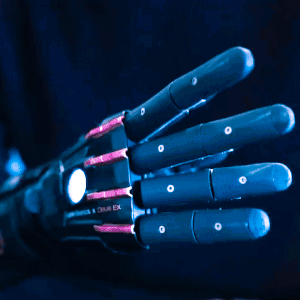
This makes it REALLY uncomfortable to engage with stories in the genre because another common aspect of cyberpunk is the idea of losing yourself and becoming something distinctly not-human anymore because you have too many cybernetic augmentations/implants. Shadowrun even has mechanics for this, which state if you get too many prosthetics, which is what cybernetics are 9 times out of 10, your character becomes a monster. These mechanics and discussions surrounding "how many robot bits make you not human anymore" are really, really uncomfortable when you remember this isn't something that's unique to a far-off future setting. Those people you're discussing the humanity of already exist. They're called amputees. If you reframe the question as "how many amputations can you have before you stop being a person" I hope you can see why an amputee like myself is not going to feel safe around you or in your fandoms.
And it's a shame, because I REALLY want to like Cyberpunk. I really, honestly do. I love the aesthetics, I love the idea of big corporations being the villains and the anti-capitalism at the heart of the genre, and I love the idea of prosthetics being not only destigmatised, but desirable. When written from a disability-inclusive lense, it honestly has the potential to be an incredibly uplifting and empowering genre. but as the genre stands right now, it's actively hostile to the very folks who are usually the stars of its stories: amputees, all because people just refuse to acknowledge us.
Cyberpunk isn't the only genre guilty of this, it's common all throughout sci-fi as a whole, but Cyberpunk is the only one where it starts becoming a serious issue due to its rampant dehumanisation of a real group of people. In other sci-fi settings, it's just kind of annoying and while it can be a form of erasure, it's not usually harmful, just...frustrating. Fantasy does it on occasion too, think pirates with a hook and a peg leg, but nowhere near as much.
If you, as an author or creator, use any of these words to describe a character or their tech in a sci-fi setting:
cybernetics/cybernetic enhancements
bionics
robot limbs
cyborgs
augmentations
You are probably writing an amputee. Please, at the very least, acknowledge it, and be mindful that those are real people who actually exist, not just a fantasy group you can speculate about.
edit:
I originally posted this article on my old Tumblr account and lot of people commented/reblogged to tell me that originally in cyberpunk, the "less human the more robot bits you have" only applied to people who opted for their limbs to be replaced by cybernetics, because it was seen as "renting out your body to corporations for money" but people who had to get cybernetics out of necessity weren't impacted. The thing is though, I really don't think that makes it better, for a few reasons. For one, where do you draw the line at "opting" to get a cybernetic prosthetic? This isn't a black and white thing, even in real life. Most amputations are done out of necessity, but there are situations where it's not the only option, just the best one. Talking from personal experience, I lost both my legs below the knee as a baby, that was a pretty clear cut case, I had a blood infection and gangrene and they had to act fast. But the infection caused lasting side effects and impacted my physical body's development and growth. By the time I got to my early 20's it was causing a lot of pain in my right leg, in my knee specifically, and when I got a bone infection in the end of that stump, I chose to have the whole thing amputated up to the knee. They only needed to take a few inches off the end of my stump, but I asked them to go higher, because of the ongoing issues in that knee, issues that would have been made worse by the shortening of the leg. I choose to remove the whole thing, knowing the joint was degrading and I probably would have lost it later in life anyway. Even if it was salvageable, it would mean much more surgery, and I've had enough of those. A boy I played wheelchair basketball with was born with a partially formed leg, it was half the size of his other leg and he wasn't able to use it al all, it was just dead weight, so he opted to get it amputated too for convenience and so he could use a prosthetic on that side. I worked with a girl who's hand didn't form properly in the womb, resulting in a normal palm, but tiny "finger nubs" (her words) with no bones inside. They weren't actively harming her usually, but she opted to get them and the top of her palm amputated after an incident at work where we were tying balloons and one of her nubs got stuck in the knot. She decided to get them amputated because it meant accidents like that would be less likely, and she could use a prosthetic more comfortably. All 3 of these are considered "optional" amputations, so would people like us be penalised in your setting? does it make sense that the technology in your setting can tell the difference, or that corporations would care about the how and why? Even stepping away from medical grey areas, if your character opts for a cybernetic arm because the corporations will financially reward her, and she's struggling to put food on the table without that help, is that really optional?
Don't get me wrong, I do think that idea could work but it would take a lot of work to do well, and most works I've seen don't do the work. Even if they did though, it doesn't change the fact that most modern uses of this trope don't mention that bit or actively ignore it. It doesn't matter in most cyberpunk works I've seen if the amputation was optional or out of necessity, they still are more prone to being seen as "less human" and in most of the sci-fi writing communities I've been part of, the authors are genuinely shocked when I ask them to remember "people with cybernetics are real people already, they're not some far-off-distant future fantasy group, they're just called amputees". Like it didn't even cross their minds. These are the people creating the works in this genre. Even if it wasn't the original intention of the genre, it's still an issue in the modern version of it. Edit 2: Elaborated a little more on why I don't think the "only people who choose it" argument works in the edit. Also, please stop telling me that old cyberpunk doesn't have this issue, I literally address that in the post lol.
#Writing Disability with Cy Cyborg#id in alt text#disability#disabled#disabilities#disabled community#disability representation#cyberpunk#scifi#disability in media#writing disability#writing#writer#amputee#amputees in media#writblr#writerblr#authors of tumblr#cybernetics#cyborgs#science fiction#sci fi#science fantasy
651 notes
·
View notes
Text
Fangs and Flames (Vampire!Aegon Targaryen x Witch!Reader x Vampire!Aemond Targaryen)
Chapter One: The Dinner

Summary: In a world of supernatural creatures, magic is no surprise. In fact, it is what defines you. As a witch, you feel like you have control over your life—until that day arrives. On their 21st birthday, everyone receives a golden envelope. No one knows where it comes from, and no one dares to question it. Inside lies the name of your destined soulmate, the person you’re meant to share the rest of your life with. For most, it’s a moment of wonder. But for you, it’s anything but magical. The moment they entered your life, both Targaryen brothers turned it upside down—though one of them seemed more determined to do so.
Word count: 3k
Chapter warnings: Language, modern AU setting, mentions of sex, Aemond is very much loved, Aegon being a menace
author's note: It's my first time writing a fanfiction and even though I struggled a lot the urge was too strong.. if the story's interesting enough I'd be happy to continue writing it! as you may notice those are not your typical vampires.. they can conceive and well, exist and function like normal human beings! They are immortal, though. feel free to ask questions, I'd love to discuss anything! english is not my first language, so I hope you keep that in mind.. any feedback, writing tip and criticism will be appreciated! hope you enjoy it as much as i've enjoyed writing it (no i was not stressed at all)
You don't know why everyone is making such a big deal out of it. When your mother came into your room and informed you about the dinner with guests coming over, you did not pay much attention to it. You supposed you would wear a pretty dress, put on a smile, make small talk with other ladies, and pretend you were interested in Westerosi politics. It is the routine you had mastered over the years, even if it is something you do not particularly enjoy. You never complain; you know it is your duty and a small price to pay for the privileged life you have.
You are the daughter of the Prime Minister, the most powerful man in Westeros, and you are perfect. You have to be. It's what everyone has been telling you; it's what your parents have been expecting from you since you could remember yourself.
You enjoy the process of maids preparing you. They brush your hair, put scented oils in it, and curl it loosely, just the way you like it. When Mellory pulls out a dress from your closet, you smile and raise an eyebrow. It is stunning; a long dress adorned with dark green stones and deep V neckline, but surely it is extravagant for a dinner. She dismisses your point and assures you it is perfect for the occasion. You trust her judgment, but a question lingers: what makes this evening so different from the others? You can't think of anyone who is worthy of this special welcome.
The dining hall is lined with extra flowers, and you notice candles placed on the table, their soft glow casting a flickering light over the polished silverware. Despite the beaming smile on her face you know your mother is nervous. She is constantly touching her necklace, a habit you often display when you are overwhelmed. The maids seem to share her anxiety, repeatedly adjusting the silverware and ensuring everything is in perfect order. Still, you refrain from asking any questions—you would find out soon enough.
The first person to catch your eye is Alicent Hightower. Her auburn curls cascading down her back always fascinate you, no matter how many times you’d seen them. She compliments your mother's dress and the jewellery adorning her neck. Only then does her brown eyes find you and she lets out a small gasp, grasping both of your hands to tell you how precious you look. You know her kind words does not necessarily mean she is being sincere, but you blush nonetheless. Your father seems to be ecstatic seeing his old friend, Viserys Targaryen. You can't recall the last time you had seen him. He was not present for his youngest son's graduation and his health prevented him from attending lavish parties wealthy people often hosted. Yet, here he is. You suppose this indeed is a special occasion.
You feel someone staring at you and turn to find Aegon Targaryen eyeing you with his arrogant smile. You know him back from the academy, how could you not? It was impossible to ignore all the trouble he caused in your freshman year. Your friend Maria called him a leech, a creature who thrived on other's humiliation and pain. That is only thing firstborn son of Viserys is good at: not missing a chance to embarrass and vex others. He often teased you for a small crush you had on senior Rafe Cameron. There was even a time when Maria almost got into a physical fight with him. You had to pull her back, reminding her he wasn’t worth it. That is true. Everyone knows Aegon Targaryen is useless. He is little more than a waste of space, a burden on the planet. People who have crossed paths with him agree on it, including his parents. Luckily he is few years older than you and graduated before he had a chance to make your life miserable.
You presume the taller man with long hair braided behind his back is Aemond, the heir to the Targaryen dynasty. He studied in Oldtown and you never had a chance to meet him. He is beautiful, even with the scar on his left eye and stoic expression. While your parents entertain their guests, you sit on the couch with Aemond, sipping cherry liqueur and occasionally nodding at whatever he had to say. He is educated and well-mannered, but you can't help feeling bored. He is trying far too hard to appear polite and every time you attempt to steer the conversation toward something more fun, he shuts you down. It's as if he doesn't want you to get to know the real him.
"Oh, stop it brother, she does not give a shit about your philosophy professor" you had nearly forgotten about Aegon until he appeared with a drink in hand and plopped down on the couch beside you. You recall there is another thing he's good at: drinking and whoring around.
"Hold your tongue, Aegon"
"It's fine, really" you smile at younger brother, amused at the direction the conversation had taken "It's not like I think of him as someone whose reputation could be tarnished any more"
"Is that so? Do you think of me often?"
"Only on the rare times I'm feeling blue. I recall there are people more useless than I can ever try to be" you reply calmly, not even looking at him. You are good at pretending, even with the most insufferable people like the Lannisters, but you don't need to when it comes to Aegon Targaryen. Or perhaps you simply can't.
"Aren't you still feisty" he is not affected by your insult at all. It's a game he likes to play. "After all I don't think I'm that useless if the thought of me lifts your spirits. Maybe the thought of me also helps you.. mhm otherwise"
"Aegon" Aemond says his name like a warning or a plea. You can't exactly tell it from the expression he's wearing
"No, let him talk" you squeeze his knee in an attempt to let him know you're alright, that you can handle the white-haired man you're now facing. You don't know when he managed to get his glass refilled, but he's sipping on it with an unbothered face. His blue eyes are fixed on you, challenging you to bite back. "Every time he opens his mouth, I am reminded of how low the bar for wit has fallen"
Aegon chuckles, and just as he’s about to say something, you hear your mother calling your name, signaling that everyone should hurry to take their seats around the dining table. Aegon purposefully sits in front you but you refuse to give him the satisfaction of winning. You do your best to avoid looking at him and maintain a nonchalant look. Instead, you take small bites of your meal, listening to your mother and Alicent discussing the latest charity event. Suddenly, Viserys struggles to rise, barely managing to stand. Everyone falls silent, their eyes fixed on him, waiting to hear his announcement. Everyone except Aegon, whose gaze remains locked on you like you’re the dessert he’s about to devour. His stare, his unfaltering grin is unnerving you. Somehow you take it as a warning that something is about to happen. Something definitely unpleasant to you. You don't listen to Viserys until he mentions your name.
"How fortunate it is to know that gods decided to unite our families" his voice is cheerful, though his hands tremble slightly as he holds a glass of champagne "Your daughter's name has been written alongside my son's where no living man can interfere"
Suddenly all eyes are on you and you feel small. You glance at your mother with helpless look and she offers you a faint smile. Anger rises within you. The Targaryens are robbing you of the magical moment you’d been dreaming of since childhood. Your birthday is only a few months away, you were supposed to find it out yourself.
"Please, forgive me, my sweet girl" he is looking at you and you can sense the sadness in his voice "I know you wanted to see it yourself, everyone does, but.. I'm afraid my health does not allow me to wait any longer"
There is an awkward silence and from the corner of your eye you can see Alicent drop her head low. There was no love between them—not like how a husband and wife should love each other—but there was mutual respect and care. Viserys was a widower and while he experienced happy marriage with his first wife Aemma, Alicent had never been given the chance to marry. She was still a teenager when her betrothed, Criston Cole was murdered by a vampire. You suspected that's why Alicent never seemed to be proud of her powers while other vampires flaunted theirs with arrogance—her sons included.
"I want to see my son with his betrothed while I still have some time. I want to see him fall in love" he says, and then he attempts to laugh "Surely that can excuse my audacity"
"Nonsense, Viserys. I am happy our families will be united" your father stands up and places a reassuring squeeze on his shoulder "I cannot ask for better husband for my daughter"
Surely he cannot be talking about Aegon, but why is he looking at you from across the table like he owns you? You know he can hear your pulse quicken and he smirks at the effect he has on you. You desperately look at Aemond who does not say anything. You cannot tell what he's thinking.
Maybe it's Daeron. He is handsome, sweet and charming. You always got along well and you would not mind falling in love with him. But why isn't he here?
"May we know who the lucky sibling is?" your mother nervously chuckles and you notice that she's fiddling with her necklace. Your fingers instinctively move to your chest to find it empty.
"Aemond"
There. The answer you have been waiting for almost 21 years, but it does not excite you. It does not send shivers down your spine because it was not supposed to happen like this. It was supposed to be magical, like you've read in the books, like you've imagined it.
"May I see the letter?" you ask impatiently, and Aemond stares at you blankly for a few seconds before pulling out the golden envelope from his pocket. You snatch it away from his grasp, and the chair screeches against the floor as you rise to your feet.
"Excuse me" with a forced smile you leave the hall and step onto the terrace. You hold the letter, examining it closely. Across his name is yours, engraved in black ink. You touch it, as if trying to make sure it’s real. It is very much real, and in a few months, you will be married to Aemond Targaryen.
You begin to think about him but how can you judge a person you've known for only an hour? Everyone speaks of him highly, which is why Viserys named him heir, but what is he truly like behind the stoic expression? He’s a puzzle you’re desperately trying to solve, but you only have a few pieces.
"It's cold outside" you hear his voice and turn around to give him the letter. He tucks it into the pocket of his jacket as if it’s nothing—just a piece of paper.
"I've wanted to see it myself. Sorry if I came across as rude, I never thought you were lying"
"You don't have to explain yourself, I understand" you both lean against the railing, looking at the sky without speaking a word. This man next to you is supposed to be your other half, but to you, he's just a stranger.
"How long have you known?"
"More than a year"
"A year?" you don't know why you sound so shocked. Most people have to wait longer. You think of Aegon who is 24 years old, still not married. You wonder who the girl destined to exchange vows with him is "I don't think I could keep that kind of secret"
"I did not exactly have a choice, did I?" You can hear amusement in his voice and you can't help but smile.
Talking to him is awkward, you realize. There are so many questions you want to ask him, but the moment does not quite feel right. This whole situation does not feel right or real for now. You can't help but feel disappointed. You're not sure whether it's because of the circumstances or because the person who's supposed to be yours is Aemond. All you want is to take a long shower, crawl under the bed and pretend this day didn't exist.
The silence is comfortable, and as much as you don’t want to go back inside, it’s truly cold outside. Being the gentleman Aemond is, he wraps his jacket around your shoulders and leads you back inside.
Your parents seem to get along together just fine. Even Alicent is laughing at something your mother said. Viserys calls Aemond over, and when you notice your favorite bottle of cherry liqueur is empty, you make your way to the kitchen. Of course, the maids can bring it to you, but you use it as an excuse to be alone.
You're walking down the stairs with slow steps when you hear the giggling. The young blonde maid, Annabelle, if you recall correctly, is standing dangerously close to Aegon. He is caging her against the wall, whispering softly and despite the fact that she seems to be enjoying his company and it's not really your business, you can’t bring yourself to simply walk past them.
"Is everything alright?" You don't intend to, but you sound a little annoyed. Her smile fades into a frown and she opens her mouth to say something, but only mumbles few words before rushing back into the kitchen.
"Trying to play the hero? She was clearly enjoying herself" though his voice is as serious as ever, you know he’s not angry
"Well, I certainly would not enjoy you two having sex in my house"
"And I certainly do not enjoy you taking all the fun away from me" he is walking towards you, the smell of alcohol lingering on his breath "Keep in mind that just because you're miserable, it doesn't mean I have to be too"
"And who exactly says I'm miserable?"
"Have you looked in the mirror?" his smile is wide, mocking and you feel a strong urge to punch him in the face.
“Ever considered it’s because I’m forced to breathe in the same room with a pathetic creature like yourself?”
"Right, I'm pathetic" he steps even closer, far too close for your comfort, but you do not move "Yet you're standing here, wasting your precious time with me"
"I like to do charity work" satisfied with your response, you swiftly walk past him.
"Then you'll surely enjoy my brother"
His words stop you and you turn around to face him. No matter how little you know about him, Aemond is still your betrothed, and you will not allow anyone to disrespect his name, especially someone like Aegon.
"You truly are pathetic"
"Eh, is that all you can say?"
"About you? Oh, there's so much I can say. Nothing remarkable though" your tone is laced with venom. You’re done with this evening, and with him. "You think insulting your brother will change the fact that you're a complete failure? You think whatever flaws he has make you look better? Grow the fuck up, Aegon. No one thinks of you as anything more than a disgrace to the Targaryen name. You’re nothing. Just flesh and bones. A body, ready to be used and discarded the next day.”
He does not say anything, he does not have to. His pale blue eyes are almost dark and you know you've hit the right spot. Yet, to your surprise, it doesn’t give you the satisfaction you expected. You turn on your heel and move past him, but he pulls your arm back, almost whispering.
"You forget what I'm capable of"
"And what is is that you're capable of? Disappointing me?" he can’t do anything to you, not if he wants to continue roaming the earth, burdened by his own existence. "Have some dignity and let go of me"
"Think you know everything, huh?"
His gaze lingers on your neck, eyes drifting toward your carotid arteries, and you know he wants to taste you—devour you—until you stop screaming, fighting, breathing.
"Have fun putting the pieces of him back together"
You stand like that for a while before he removes his grip from you and resumes drinking whatever he had been holding.
You contemplate it for a while, but on your way to the kitchen you mutter a few words to yourself. Then you hear glass shattering and Aegon cursing your name. A faint smile curls your lips, and the maids glance at you suspiciously.
"I need more cherry liqueur"
They're happy to oblige your request. When you finally go back to the dining hall you don't look at Aegon and his stained shirt. Instead, your attention, like everyone else’s, turns to Viserys, who is frantically coughing. Alicent and Aemond try to help him up. Soon after, they leave, but not before your betrothed kisses the back of your hand and Aegon throws you a disgusted look.
You are laying in the bed, staring at the ceiling. Whatever effect alcohol had on you seemed to wash away under cold shower. You think of Targaryens but it's not Aemond that occupies your thoughts. You think of his brother and what you said to him. A wave of guilt consumes you. Perhaps you were too cruel? Your words were truthful, but they were harsh—even for someone like Aegon. You can’t shake his disgusted expression from your mind, and as sleep finds you, you dream of him.
He is clutching your waist, his hand pressed between your neck and shoulder, while you desperately claw at him, trying to push him away. His grip tightens, and every attempt to escape only seems to encourage him further. Tears stream down your face, and your breath quickens. The last thing you see is his bloodstained mouth. Then everything fades to black.
#aegon targaryen x reader#aemond targaryen x reader#aemond x reader#aegon x reader#hotd fanfic#aemond fanfiction#aegon fanfiction#aegon targaryen x you#aemond targaryen x you#house of the dragon fanfiction
71 notes
·
View notes
Text
If Inquisitor Lavellan is Hope, Elf!Rook is Freedom
Forgive my rambling but I just wanted to share this, see if it inspires discussion/theories/new friends to reach out, and maybe cement myself in this fandom.
SPOILERS AHEAD!!!
I've given a sparing thought to some theories and headcanons I've seen circulating with the confirmation of elves once being spirits in Veilguard and all the clues sprinkled throughout Inquisition. One has popped up that I find intriguing and I agree with. Inquisitor Lavellan is a Spirit of Hope.
I think there is a very strong case for that, especially for those Solasmancers out there who love to pair them up as Wisdom and Hope. It's a very beautiful thought as they are without a doubt soulmates, at least in the cases where those two end up together.
Hope defines the Inquisitor's journey. They become the Herald of Andraste, a symbol to look to after a period of ruthless war, then into the ass-end of a demon apocalypse trying to mend a broken world. Deed after great deed they prove their capabilities, and become a formidable player in Thedas's history, keeping people looking up. They are the Dawn That Comes.
Now that Veilguard has since confirmed that Elves were spirits made flesh, I've started to wonder at what possible spirit Rook could be, should they be of Elven lineage. I've decided, either through evidence or delusion or trying to piece together the fanfic I've got brewing, that Rook could be a spirit of Freedom.
Every faction could have some way of a purpose toward liberation. A Veil Jumper would want to free their history and their people from ignorance. A Grey Warden would want to free Thedas from the Calling and the Blight. The strongest background, and most the likely canon faction for Rook would be a Shadow Dragon, putting pressure on the Imperium to abolish slavery.
Rook has a knack for freedom. We free Lucanis from the Ossuary, the Dalish Elves from the Venatori, the Kal Sharok dwarves from the Titan's anger, young griffons from the Gloomhowler. We even free ourselves from a prison of regret built specifically to lock up gods.
My first go round, I played a Lord of Fortune Spellsword, and it coincided very nicely with this theory. An ex-galley slave turned marauding treasure hunter with no masters to hold them back. She lived and breathed freedom so it made sense, at least for my Rook.
We also see the potential to corrupt that spirit of freedom. Into what you ask? CHAOS. Which also ties into the other thing that connects them to Solas; The Tower.
The big teaser for Rook as the protagonist back when it was still called Dreadwolf was the Tower/rook chess piece and floating head of a wolf. Solas's Arcana at the end of Inquisition is the Tower. This Major Arcana represents calamity, disruption, upheaval, unavoidable change, chaos.
Too much freedom leads to lawlessness, and Rook is never one to follow rules as far as we witness. In all backgrounds, no matter the faction, Rook's actions cause unrest, turmoil, disruption, often a total breakdown of authority, much like the spirit they are mistaken for when delving into Solas's memories in the Crossroads.
Rook cannot be caged or told what to do. But also, Freedom cannot go unchecked, to do so on either end of the spectrum just leads to untold mayhem. It needs a guiding hand. It needs Wisdom.
With this in mind, it just makes their dynamic with Solas so much more fascinating. Everything he has done is in the name of Freedom, and if he were to have a living embodiment of it move against him it would be so confronting. It would make him question his entire angle. Why is he really doing this, if not for freedom? But his pride would keep him in imprisoned in denial and regret. This denial is then reflected back to Rook in regards to the fate of Varric.
The case for each spirit, both Hope and Freedom, only intensifies if one chooses the Atonement ending.
Lavellan sees the Wisdom in Solas and tries to appeal to him through that. She gives him Hope, and joins him in the dream, forever protected from his fear of dying alone.
Rook holds a mirror to his Pride, his mistakes, his trauma and makes him confront it. They gather all the pieces needed to unravel his fear, allow him to let go and make his own choice to atone and return to his true self, opening a path to true Freedom to finally come home to the Fade. WHICH IS TWIN-FLAMEY AS FUCK
So yeah, I love this game. EDIT: I've expanded on this with a second part regarding Elgar'nan and will in the future take a look at Rook/Freedom in relation to Mythal as Benevolence and Retribution.
#dragon age#dragon age rook#dragon age the veilguard#lord of fortune rook#riggie rambles#dragon age inquisition#dragon age spoilers#dragon age theory#inquisitor lavellan#solas x inquisitor#dragon age inquistor#solas x rook#solas dragon age#solavellan#solrook#dreadrook
68 notes
·
View notes
Text
The thing about Murders at Karlov Manor is that from a story perspective, it couldn't have been set anywhere but Ravnica. And it especially couldn't have been set on New Capenna.
The story of Murders is ultimately about the fallout of March of the Machine on both Ravnica as a city, and on Kaya personally. The motivations for the high-profile deaths that litter the set are tied directly to elements of the Phyrexian invasion. The manner of murder is specifically set up to overcome the barriers Ravnica as a setting provides to a murder mystery. And Kaya only gets involved because of her questionably defined but always present relationship with Teysa Karlov.
Ravnica also comes pre-built with a host of established characters, who conveniently all hate each other. This enabled readers to theorise about whodunnit, as each daily chapter provided more information and more intrigue. People considered all kinds of threads: Could Jace be involved? Might Azor be pulling the strings somehow? How does Judith plan to survive her crazy plan? Lazav?? By the time Proft said "I know who the killer is", you too could get it. (then for some reason they delayed the reveal chapter so they could reveal the killer in a spoiler stream. even when the story is good, the management is bad)
If you move the story out of Ravnica, the whole thing falls apart. You lose everything that makes it work. A new plane would be functional, but a lot less engaging. Fiora is about political scheming, even more so than Ravnica. And New Capenna...
New Capenna is not a particularly well constructed setting. It works as a sparse background for a Magic set, but when you start poking at it, it falls over. Like, one of the nicer ways to describe New Capenna is "discount Ravnica", because you are comparing it to one of the game's most successful settings. And that's what New Capenna is - a city controlled by a number of distinct factions, built out of specific colour combinations. But the New Capenna factions are not as good as the Ravnica ones (and the Obscura are literally just the Dimir). There is crime on New Capenna, but there is no authority against which that crime is committed, which makes things rather hollow. Ravnica, as strange as its laws are, has laws, along with people to enforce them. (note: I am aware of the Doylist reason why New Capenna has no police. Watson is still crying.)
Ravnica being well-developed allows it to function as a backdrop for a different idea. New Capenna's issues do the opposite. In fact, any return to New Capenna would need to reckon with how the setting got completely turned over by the return of the angels. You can't just say "well the crime has punishment now, onto the mystery". You have to actually engage with the big change, or you're just dragging New Capenna into a deeper hole.
conclusion: When the Magic story is good it's because the writer looked at the setting and characters they were given and used them together well. This is only possible if you have a setting and characters that can be used well. Ravnica has that, the crime plane does not.
336 notes
·
View notes